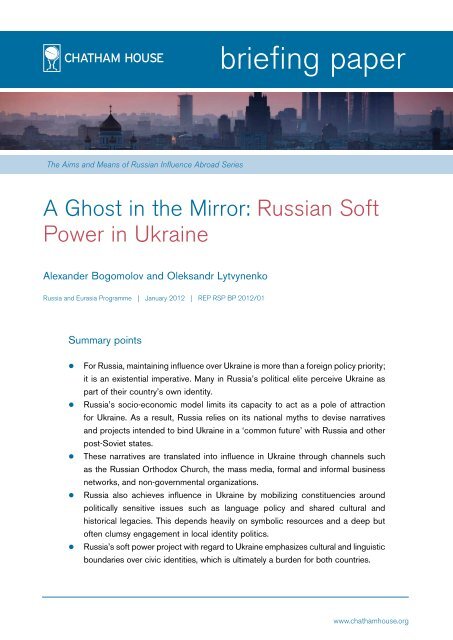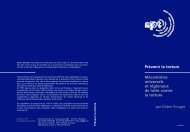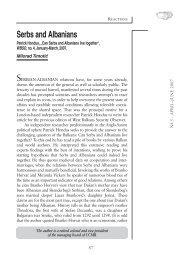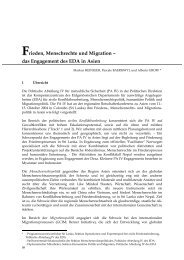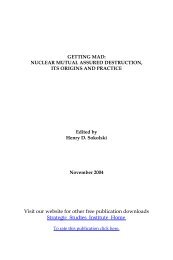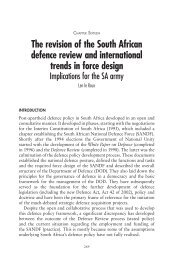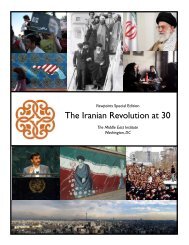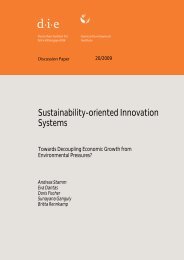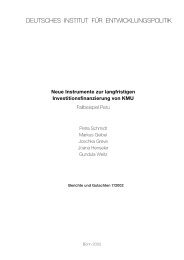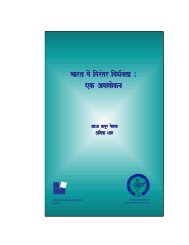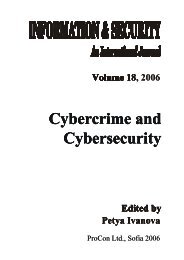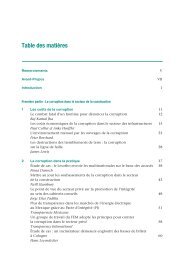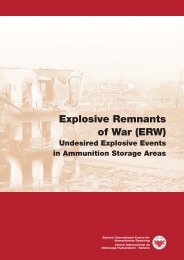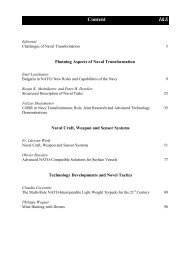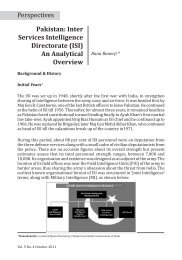Create successful ePaper yourself
Turn your PDF publications into a flip-book with our unique Google optimized e-Paper software.
The Aims and Means of Russian Influence Abroad Series<br />
brief<strong>in</strong>g paper<br />
A <strong>Ghost</strong> <strong>in</strong> <strong>the</strong> <strong>Mirror</strong>: Russian Soft<br />
Power <strong>in</strong> Ukra<strong>in</strong>e<br />
Alexander Bogomolov and Oleksandr Lytvynenko<br />
Russia and Eurasia Programme | January 2012 | REP RSP BP 2012/01<br />
Summary po<strong>in</strong>ts<br />
zz For Russia, ma<strong>in</strong>ta<strong>in</strong><strong>in</strong>g <strong>in</strong>fluence over Ukra<strong>in</strong>e is more than a foreign policy priority;<br />
it is an existential imperative. Many <strong>in</strong> Russia’s political elite perceive Ukra<strong>in</strong>e as<br />
part of <strong>the</strong>ir country’s own identity.<br />
zz Russia’s socio-economic model limits its capacity to act as a pole of attraction<br />
for Ukra<strong>in</strong>e. As a result, Russia relies on its national myths to devise narratives<br />
and projects <strong>in</strong>tended to b<strong>in</strong>d Ukra<strong>in</strong>e <strong>in</strong> a ‘common future’ with Russia and o<strong>the</strong>r<br />
post-Soviet states.<br />
zz These narratives are translated <strong>in</strong>to <strong>in</strong>fluence <strong>in</strong> Ukra<strong>in</strong>e through channels such<br />
as <strong>the</strong> Russian Orthodox Church, <strong>the</strong> mass media, formal and <strong>in</strong>formal bus<strong>in</strong>ess<br />
networks, and non-governmental organizations.<br />
zz Russia also achieves <strong>in</strong>fluence <strong>in</strong> Ukra<strong>in</strong>e by mobiliz<strong>in</strong>g constituencies around<br />
politically sensitive issues such as language policy and shared cultural and<br />
historical legacies. This depends heavily on symbolic resources and a deep but<br />
often clumsy engagement <strong>in</strong> local identity politics.<br />
zz Russia’s soft power project with regard to Ukra<strong>in</strong>e emphasizes cultural and l<strong>in</strong>guistic<br />
boundaries over civic identities, which is ultimately a burden for both countries.<br />
www.chathamhouse.org<br />
page 1
page 2<br />
A <strong>Ghost</strong> <strong>in</strong> <strong>the</strong> <strong>Mirror</strong>: Russian Soft Power <strong>in</strong> Ukra<strong>in</strong>e<br />
Introduction<br />
Like any state, Russia would not <strong>in</strong>vest significant effort<br />
<strong>in</strong>to project<strong>in</strong>g power over ano<strong>the</strong>r state were it not<br />
guided by a firm conviction that it had significant <strong>in</strong>terests<br />
at stake. Russia’s policy towards Ukra<strong>in</strong>e is no exception.<br />
Russian <strong>in</strong>terests <strong>in</strong> Ukra<strong>in</strong>e are manifold, and <strong>the</strong>y<br />
are all significant. In an overarch<strong>in</strong>g sense, <strong>the</strong>y are also<br />
unique. Russia sees Ukra<strong>in</strong>e as part of its own identity.<br />
The def<strong>in</strong><strong>in</strong>g objective of Ukra<strong>in</strong>e s<strong>in</strong>ce <strong>the</strong> collapse of<br />
<strong>the</strong> Soviet Union to adopt a truly <strong>in</strong>dependent course<br />
from Russia and ‘return to European civilization’ can<br />
thus be seen as a threat to Russia’s conception of itself.<br />
Should such a course come to fruition, it would have<br />
profound implications for Russia’s <strong>in</strong>ternal development<br />
and its position <strong>in</strong> <strong>the</strong> world. This was reflected <strong>in</strong> 2009<br />
when Russian President Dmitry Medvedev declared that<br />
‘for Russia, Ukra<strong>in</strong>ians s<strong>in</strong>ce <strong>the</strong> dawn of time have been<br />
and rema<strong>in</strong> not only neighbours, but a bro<strong>the</strong>rly people’.<br />
Therefore he regarded it as an obligation on Ukra<strong>in</strong>e’s<br />
part to ma<strong>in</strong>ta<strong>in</strong> ‘tight economic cooperation’ and ‘solidly<br />
k<strong>in</strong>dred, humanitarian ties’ with Russia. 1<br />
In more practical terms, Russia has not managed to<br />
construct a s<strong>in</strong>gle coherent conception of how to br<strong>in</strong>g its<br />
<strong>in</strong>terests to bear on <strong>the</strong> reality that Russia and Ukra<strong>in</strong>e are<br />
now two sovereign states. Russia’s political elite has no wish<br />
to restore <strong>the</strong> USSR, and it clearly understands that this<br />
would be impossible, but <strong>the</strong>re still is no agreement about<br />
what should replace it. This reflects <strong>the</strong> <strong>in</strong>terplay of <strong>in</strong>terests<br />
and forces not only <strong>in</strong> former Soviet republics, but <strong>in</strong> Russia<br />
itself. With respect to Ukra<strong>in</strong>e, three l<strong>in</strong>es of thought can be<br />
identified <strong>in</strong> Russia’s approach, each of <strong>the</strong>m <strong>in</strong>vok<strong>in</strong>g hard<br />
and soft dimensions of power: <strong>the</strong> debate over collective<br />
values, <strong>the</strong> competition for economic assets and <strong>the</strong> competition<br />
between political forces.<br />
These debates express not only <strong>in</strong>terests but sentiments.<br />
For <strong>the</strong>se reasons, <strong>the</strong>y are advanced not only by<br />
various forms of power but through dist<strong>in</strong>ctive modes<br />
of discourse. The <strong>in</strong>terplay between <strong>in</strong>terest and power,<br />
sentiment and discourse <strong>in</strong> relations between Russia and<br />
Ukra<strong>in</strong>e is <strong>the</strong> subject of this paper.<br />
www.chathamhouse.org<br />
The s<strong>in</strong>gularity of Russian–Ukra<strong>in</strong>ian<br />
relations<br />
Accord<strong>in</strong>g to Joseph Nye, ‘some countries may be attracted to<br />
o<strong>the</strong>rs with hard power by <strong>the</strong> myth of <strong>in</strong>v<strong>in</strong>cibility or <strong>in</strong>evitability’,<br />
but a country that ‘suffers economic decl<strong>in</strong>e’ is likely<br />
to lose soft- as well as hard-power resources. 2 This paper<br />
argues that <strong>the</strong> capacity of a nation to project soft power<br />
depends <strong>in</strong> part on its perceptions by o<strong>the</strong>rs as an expand<strong>in</strong>g<br />
political or economic force. A country cannot project soft<br />
power over time unless it has a strong conception of itself<br />
and its future. The stronger and more universally accepted<br />
this conception, <strong>the</strong> greater <strong>the</strong> soft power it projects. The<br />
EU’s soft power lies <strong>in</strong> <strong>the</strong> attractiveness of its way of life.<br />
But it also lies <strong>in</strong> its capacity to expand and <strong>the</strong>refore offer<br />
<strong>the</strong> perspective of this way of life to o<strong>the</strong>r nations. Thanks<br />
to events <strong>in</strong> recent years, <strong>the</strong> EU’s soft power potential has<br />
dim<strong>in</strong>ished <strong>in</strong> Ukra<strong>in</strong>e and fur<strong>the</strong>r to <strong>the</strong> east. The source<br />
of American soft power lies not only <strong>in</strong> <strong>the</strong> strength of its<br />
democratic <strong>in</strong>stitutions but <strong>in</strong> its commitment to support<br />
democracy worldwide. The universalist concept of democracy<br />
rema<strong>in</strong>s essentially an American one. Yet <strong>the</strong> relative<br />
decl<strong>in</strong>e of US power and <strong>the</strong> wars <strong>in</strong> Iraq and Afghanistan<br />
have weakened <strong>the</strong> country’s universalist impulse and dim<strong>in</strong>ished<br />
<strong>the</strong> legitimacy of American <strong>in</strong>fluence abroad.<br />
This <strong>in</strong>ternational context has a powerful, if often <strong>in</strong>direct,<br />
bear<strong>in</strong>g on Ukra<strong>in</strong>e’s ability to give substance to its own<br />
national myths. As a newly <strong>in</strong>dependent state, Ukra<strong>in</strong>e has<br />
relied on three key myths of <strong>the</strong> future: <strong>the</strong> ethno-national<br />
one – a state that embodies <strong>the</strong> historical aspirations of <strong>the</strong><br />
Ukra<strong>in</strong>ian people; <strong>the</strong> liberal-democratic one – a state that<br />
protects <strong>the</strong> liberty of all citizens, irrespective of nationality;<br />
and <strong>the</strong> European one – a state that is an <strong>in</strong>alienable part<br />
of European civilization. For a large part of <strong>the</strong> Ukra<strong>in</strong>ian<br />
political spectrum, <strong>the</strong>se ideas are complementary. They<br />
po<strong>in</strong>t to one of two political dest<strong>in</strong>ations – European or<br />
Euro-Atlantic <strong>in</strong>tegration – and for many <strong>the</strong>y po<strong>in</strong>t to both.<br />
For its part, Russia has relied on its own national myths<br />
to devise narratives and projects designed to l<strong>in</strong>k Ukra<strong>in</strong>e’s<br />
future with <strong>the</strong> ‘common’ future of o<strong>the</strong>r post-Soviet countries,<br />
particularly <strong>the</strong> East Slavic ones. The most recent of<br />
1 ‘Poslanie Prezidentu Ukra<strong>in</strong>y Viktoru Yushchenko’ [Message to President of Ukra<strong>in</strong>e Viktor Yushchenko], 11 August 2009, http://kreml<strong>in</strong>.ru/news/5158.<br />
2 Joseph Nye, Soft Power: The Means to Success <strong>in</strong> World Politics (New York: Public Affairs: 2004).
<strong>the</strong>se is technocratic, <strong>in</strong>spired by <strong>the</strong> renewed discourse of<br />
‘modernization’: a trademark <strong>the</strong>me of President Dmitry<br />
Medvedev, 3 associated with government-sponsored hightech<br />
projects such as Russia’s projected ‘Silicon Valley’<br />
at Skolkovo. Such projects complement <strong>the</strong> technocratic<br />
self-image of <strong>the</strong> current Ukra<strong>in</strong>ian government under<br />
President Viktor Yanukovych, which is oblivious to <strong>the</strong><br />
criticism that no modernization is possible without a<br />
transformation of <strong>the</strong> socio-political order <strong>in</strong> Ukra<strong>in</strong>e<br />
and Russia. ‘Modernization’ has refurbished <strong>the</strong> Russian<br />
<strong>the</strong>ory that Ukra<strong>in</strong>e’s present is Russia’s past, and <strong>the</strong><br />
govern<strong>in</strong>g elite <strong>in</strong> Kyiv appears to have adopted it. As a case<br />
<strong>in</strong> po<strong>in</strong>t, government experts are now expected to enter a<br />
paragraph on relevant ‘Russian experience’ while writ<strong>in</strong>g<br />
policy papers. The current adm<strong>in</strong>istrative reform attempted<br />
by Yanukovych’s government has been modelled on <strong>the</strong><br />
Russian adm<strong>in</strong>istrative reform of 2003 despite <strong>the</strong> fact that<br />
<strong>the</strong> latter failed to meet its goals. A key element borrowed<br />
from <strong>the</strong>se Russian reforms is <strong>the</strong> quadripartite structure of<br />
<strong>the</strong> executive (m<strong>in</strong>istries, agencies, services and <strong>in</strong>spections).<br />
The fact rema<strong>in</strong>s that Russia’s socio-economic model<br />
limits <strong>the</strong> country’s capacity to act as a pole of attraction<br />
for its neighbours. Soft power is typically based on projections<br />
of shared future prosperity and success. In Russia’s<br />
case, however, its soft power is strongly associated with<br />
discourses of a shared past and with <strong>the</strong> common values,<br />
culture and history that arise from it.<br />
From this political perspective, Russia sees ‘Ukra<strong>in</strong>ian<br />
nationalism’ as an existential threat. Evidence that Russian<br />
policy-makers perceive (non-Russian) nationalism as an<br />
extremist ideology is abundant. The 2009 National Security<br />
Strategy of <strong>the</strong> Russian Federation to 2020 conta<strong>in</strong>s four<br />
references to ‘nationalism’, and <strong>in</strong> each case ‘nationalism’<br />
and ‘nationalist dispositions’ are equated with threats to<br />
<strong>the</strong> security of <strong>the</strong> Russian Federation. In late 2010, <strong>the</strong><br />
Department for Combat<strong>in</strong>g Extremism of <strong>the</strong> Russian<br />
M<strong>in</strong>istry of Interior closed <strong>the</strong> Ukra<strong>in</strong>ian Library <strong>in</strong><br />
Moscow, so that books conta<strong>in</strong><strong>in</strong>g <strong>the</strong> world ‘nationalism’<br />
could be exam<strong>in</strong>ed by ‘experts’ for harmful content. 4<br />
A <strong>Ghost</strong> <strong>in</strong> <strong>the</strong> <strong>Mirror</strong>: Russian Soft Power <strong>in</strong> Ukra<strong>in</strong>e<br />
S<strong>in</strong>ce Vladimir Put<strong>in</strong> came to power, Russia has<br />
developed a form of state nationalism <strong>in</strong>corporat<strong>in</strong>g<br />
neo-imperial discourses such as neo-Eurasianism and<br />
<strong>the</strong> concept of <strong>the</strong> ‘Russian World’ (Russkii Mir), whose<br />
boundaries are assumed to correspond, at <strong>the</strong> m<strong>in</strong>imum,<br />
to <strong>the</strong> borders of <strong>the</strong> core territories of <strong>the</strong> Russian empire.<br />
Of late, a more aggressive, grass-roots nativist nationalism<br />
has risen to challenge <strong>the</strong> older imperial one. Yet <strong>the</strong><br />
contrast between <strong>the</strong> two – which has direct implications<br />
for Muslims <strong>in</strong> Russia and <strong>the</strong> ‘near abroad’ – has far less<br />
significance for ‘bro<strong>the</strong>r Slavs’.<br />
‘ Although relations between<br />
Russians and Ukra<strong>in</strong>ians may<br />
be closer and more amicable<br />
than between Russians and<br />
Georgians or Russians and<br />
Poles, <strong>the</strong> myths of <strong>the</strong> Russian<br />
and Ukra<strong>in</strong>ian nations are far<br />
more deeply opposed ’<br />
Ukra<strong>in</strong>ian and Russian national myths can be at crosspurposes<br />
even when <strong>the</strong>y embody unassailable truths.<br />
Although relations between Russians and Ukra<strong>in</strong>ians may<br />
be closer and more amicable than between Russians and<br />
Georgians or Russians and Poles, <strong>the</strong> myths of <strong>the</strong> Russian<br />
and Ukra<strong>in</strong>ian nations are far more deeply opposed. This<br />
is because <strong>the</strong> very idea of a Ukra<strong>in</strong>ian nation separate<br />
from <strong>the</strong> great Russian nation challenges core beliefs<br />
about Russia’s orig<strong>in</strong> and identity. Ukra<strong>in</strong>e hosts <strong>the</strong> most<br />
valuable symbols constitut<strong>in</strong>g <strong>the</strong> core of Russia’s national<br />
identity – <strong>the</strong> mythological birthplace of <strong>the</strong> Russian<br />
nation and <strong>the</strong> cradle of <strong>the</strong> Russian Orthodox Church<br />
along with its holiest places. It is <strong>the</strong> control of Kyiv that<br />
3 Dmitry Medvedev, ‘Rossiya, vperiod!’ [Russia Forward!], Gazeta.ru, 10 September 2009, http://www.gazeta.ru/comments/2009/09/10_a_3258568.shtml.<br />
4 Aleksandr Artem’ev, ‘Biblioteku zakryli “chuzhi lyude” [sic]. Biblioteka ukra<strong>in</strong>skoi literatury zakryta posle obyska po delu ob ekstremizme’ [‘Outsiders’ closed <strong>the</strong><br />
library. The library of Ukra<strong>in</strong>ian literature has been closed after a search on suspicion of extremism], Gazeta.ru, 27 December 2010,<br />
http://www.gazeta.ru/politics/2010/12/27_a_3478978.shtml.<br />
www.chathamhouse.org<br />
page 3
page 4<br />
A <strong>Ghost</strong> <strong>in</strong> <strong>the</strong> <strong>Mirror</strong>: Russian Soft Power <strong>in</strong> Ukra<strong>in</strong>e<br />
helped solidify Russia’s claim to imperial status. In time,<br />
<strong>the</strong>se myths of common national orig<strong>in</strong> were complemented<br />
by <strong>the</strong> myth that Russian language and culture are<br />
a legacy shared by all Eastern Slavs, and <strong>the</strong> myth of <strong>the</strong><br />
perpetual <strong>in</strong>cremental growth of <strong>the</strong> Russian state, o<strong>the</strong>rwise<br />
known as ‘<strong>the</strong> ga<strong>the</strong>r<strong>in</strong>g of Russian lands’.<br />
These predispositions were refurbished when <strong>the</strong><br />
monarchy set out to reconstitute Russia as a nationstate<br />
<strong>in</strong> <strong>the</strong> 19th century. In <strong>the</strong> aftermath of <strong>the</strong> Polish<br />
Rebellion of 1863, <strong>the</strong> ideology of <strong>the</strong> tripartite Russian<br />
people became <strong>the</strong> basis of official government policy. 5<br />
This ideology proved to be so effective that it outlasted<br />
<strong>the</strong> monarchy and carried on with variations through <strong>the</strong><br />
Soviet period.<br />
From this perspective, <strong>the</strong> collective goods that<br />
br<strong>in</strong>g <strong>the</strong> majority of Ukra<strong>in</strong>ians toge<strong>the</strong>r as a nation<br />
(e.g. Taras Shevchenko’s legacy, Ukra<strong>in</strong>ian language, and<br />
<strong>the</strong> Ukra<strong>in</strong>ian ‘national idea’ of <strong>the</strong> last two centuries)<br />
appear to be mean<strong>in</strong>gless, second-rate or blasphemous to<br />
a large number of Russians. Generations of Russian <strong>in</strong>tellectuals6<br />
have turned belittl<strong>in</strong>g of <strong>the</strong> Ukra<strong>in</strong>ian language<br />
and culture <strong>in</strong>to a part of <strong>the</strong> Russian belief system alongside<br />
anti-Tatar and anti-Muslim stereotypes. But whereas<br />
<strong>the</strong> latter are built around national differences, what<br />
makes Ukra<strong>in</strong>e stand out <strong>in</strong> this list is a dismissive attitude<br />
to any assertion that national differences exist.<br />
This coexistence between friendship for a ‘k<strong>in</strong>dred people’<br />
and hostility to <strong>the</strong> Ukra<strong>in</strong>ian nation is what gives relations<br />
between Ukra<strong>in</strong>e and Russia <strong>the</strong>ir dist<strong>in</strong>ctive quality. More<br />
than 18 years after Russia officially recognized Ukra<strong>in</strong>e as<br />
an <strong>in</strong>dependent state, Put<strong>in</strong> underscored <strong>the</strong> po<strong>in</strong>t when he<br />
quoted <strong>the</strong> words of General Anton Denik<strong>in</strong>, who referred<br />
to Ukra<strong>in</strong>e as ‘Russia M<strong>in</strong>or’ 7 and said that attempts to<br />
separate Ukra<strong>in</strong>e from Russia were a ‘crime’. 8<br />
www.chathamhouse.org<br />
Russia, Ukra<strong>in</strong>e and Europe<br />
Toge<strong>the</strong>r, Europe and <strong>the</strong> West, both as normative constructs<br />
and as compet<strong>in</strong>g sources of <strong>in</strong>fluence and attraction, play<br />
an important role <strong>in</strong> <strong>the</strong> dynamics of Ukra<strong>in</strong>e’s relations<br />
with Russia. From <strong>the</strong> time of Mikhail Gorbachev, Russia<br />
has steered a course towards qualified re<strong>in</strong>tegration with<br />
<strong>the</strong> West. While <strong>the</strong> discourse of common values espoused<br />
dur<strong>in</strong>g Boris Yelts<strong>in</strong>’s presidency has gone, and Moscow<br />
has adopted a far more confrontational posture, <strong>the</strong> current<br />
elite cont<strong>in</strong>ues to identify with <strong>the</strong> West. 9 As a prom<strong>in</strong>ent<br />
centrist politician, Konstant<strong>in</strong> Kosachev, Chairman of <strong>the</strong><br />
State Duma Commission on Foreign Affairs, said <strong>in</strong> 2010:<br />
Hav<strong>in</strong>g proved that Russia, while be<strong>in</strong>g one of <strong>the</strong><br />
geopolitical ‘power centres’ of <strong>the</strong> modern world, does not<br />
constitute an ideological pole of it, we may reach a pr<strong>in</strong>cipled,<br />
different form of <strong>in</strong>teraction with <strong>the</strong> West, putt<strong>in</strong>g<br />
<strong>the</strong> f<strong>in</strong>al dot on <strong>the</strong> Cold War and f<strong>in</strong>ally formulate <strong>the</strong><br />
political conclusion of <strong>the</strong> 20th century. 10<br />
The possibility that Ukra<strong>in</strong>e could pre-empt Russia <strong>in</strong><br />
jo<strong>in</strong><strong>in</strong>g <strong>the</strong> West is ana<strong>the</strong>ma to <strong>the</strong> Russian leadership.<br />
Ukra<strong>in</strong>e’s accession to NATO or <strong>the</strong> EU would mean <strong>the</strong><br />
break<strong>in</strong>g of an established historical sequence whereby<br />
Ukra<strong>in</strong>e has always been second to Russia. The tone of<br />
commentary <strong>in</strong> Russia on <strong>the</strong> New START Treaty with<br />
<strong>the</strong> United States was quite reveal<strong>in</strong>g <strong>in</strong> terms of <strong>the</strong><br />
importance attached to <strong>the</strong> issues of status <strong>in</strong> <strong>in</strong>ternational<br />
relations compared with those of substance. By <strong>the</strong> same<br />
token, Ukra<strong>in</strong>e’s putative accession to NATO has been less<br />
of a threat to Russia’s security than to its status. Indeed, <strong>the</strong><br />
2009 National Security Strategy of <strong>the</strong> Russian Federation<br />
to 2020 does not cite NATO as a security threat but, paradoxically,<br />
presents Ukra<strong>in</strong>e’s and Georgia’s membership <strong>in</strong><br />
5 Andreas Kappeler, ‘Mazep<strong>in</strong>tsy, Malorossy, Khokhly: Ukra<strong>in</strong>tsy v Etnicheskoi Ierarkhii Rossiiskoi Imperii’ [Mazep<strong>in</strong>tsy, Malorossy, Khokhly: Ukra<strong>in</strong>ians <strong>in</strong> <strong>the</strong><br />
Ethnic Hierarchy of <strong>the</strong> Russian Empire], <strong>in</strong> B. N. Floria, A. I. Miller, Rossiia–Ukra<strong>in</strong>a: Istoriia Vzaimootnoshenii [Russia Ukra<strong>in</strong>e: A History of Bilateral Relations<br />
(Moscow: Iazyki Russkoi Kultury [Languages of Russian Culture], 2001).<br />
6 See, for example, Vissarion Bel<strong>in</strong>sky’s review of Nikolai Markevich’s ‘Istoria Malorossii’ (History of Russia M<strong>in</strong>or); Vladimir Nabokov’s essays on Nikolai Gogol;<br />
or Joseph Brodsky’s poem ‘Na niezavisimost’ Ukra<strong>in</strong>y’ (‘On Ukra<strong>in</strong>e’s Independence’).<br />
7 ‘Malorossia’ or ‘Malaya Rus’, an obsolete historical geographic name for Ukra<strong>in</strong>e’s core lands that was used officially <strong>in</strong> <strong>the</strong> title of <strong>the</strong> Russian emperors.<br />
8 ‘Put<strong>in</strong> vychital, chto Rossiya sama razberetsya s Malorossiyei’ [Put<strong>in</strong> warns that Russia will deal with Little Russia itself], Ukra<strong>in</strong>skaya Pravda, 24 May 2009,<br />
http://www.pravda.com.ua/rus/news/2009/05/24/4486483.<br />
9 Dmitri Tren<strong>in</strong>, Integration and Identity: Russia as <strong>the</strong> ‘New West’ (Moscow: Europe Publish<strong>in</strong>g House, 2006), p. 472.<br />
10 Konstant<strong>in</strong> Kosachev, ‘Values for <strong>the</strong> Sake of Unification’, Russia <strong>in</strong> Global Affairs, 9 April 2010, http://eng.globalaffairs.ru/number/Values_for_<strong>the</strong>_Sake_of_<br />
Unification-14790.
<strong>the</strong>se terms. Similarly, <strong>the</strong> 2010 Russian military doctr<strong>in</strong>e<br />
cites NATO enlargement as well as <strong>the</strong> movement of military<br />
<strong>in</strong>frastructure closer to Russia as <strong>the</strong> first of eleven<br />
‘ma<strong>in</strong> military dangers’, while NATO as such is presented<br />
as a partner with which it is worth ‘develop<strong>in</strong>g relations’. 11<br />
The issue is not conf<strong>in</strong>ed to status. Ukra<strong>in</strong>e’s WTO<br />
accession process was seriously h<strong>in</strong>dered and prolonged<br />
by <strong>in</strong>terference that came <strong>in</strong> several forms: <strong>the</strong> Russian<br />
mass media, political agents such as <strong>the</strong> Communist<br />
Party of Ukra<strong>in</strong>e and direct pressure upon <strong>the</strong> Ukra<strong>in</strong>ian<br />
leadership (<strong>in</strong>clud<strong>in</strong>g <strong>the</strong> threat to impose new import<br />
duties). 12 Even greater pressure has been applied s<strong>in</strong>ce<br />
Ukra<strong>in</strong>e entered <strong>the</strong> f<strong>in</strong>al phase of its negotiations on an<br />
Association Agreement and Deep and Comprehensive<br />
Free Trade Area with <strong>the</strong> EU. On a number of official<br />
visits to Ukra<strong>in</strong>e Put<strong>in</strong> aggressively called for its accession<br />
to <strong>the</strong> Customs Union with Russia, Kazakhstan and<br />
Belarus, and so did a host of Russian-sponsored media. 13<br />
Russian political culture so resists <strong>the</strong> idea that Ukra<strong>in</strong>e<br />
might wish to go it alone that a school of thought has arisen<br />
<strong>in</strong> Moscow which ma<strong>in</strong>ta<strong>in</strong>s that <strong>the</strong> real aim of Ukra<strong>in</strong>e is<br />
to resurrect Kyiv as <strong>the</strong> capital of <strong>the</strong> Eastern Slavs. In o<strong>the</strong>r<br />
words, Ukra<strong>in</strong>e is struggl<strong>in</strong>g for primacy just as Russia is!<br />
This <strong>the</strong>sis emerged at a time when Russian society was<br />
try<strong>in</strong>g to come to grips with <strong>the</strong> challenges presented by<br />
<strong>the</strong> Orange Revolution. Recently, it was resurrected by <strong>the</strong><br />
Russian Consul <strong>in</strong> Lviv, Evgenii Guzeev:<br />
Maybe, after some time, – perhaps, <strong>in</strong> a century – <strong>the</strong> centre<br />
will come back aga<strong>in</strong> here, and Kyiv will aga<strong>in</strong> be <strong>the</strong> centre<br />
A <strong>Ghost</strong> <strong>in</strong> <strong>the</strong> <strong>Mirror</strong>: Russian Soft Power <strong>in</strong> Ukra<strong>in</strong>e<br />
of our culture. Now no one can know it. The ma<strong>in</strong> th<strong>in</strong>g<br />
is to preserve our s<strong>in</strong>gle civilizational space, <strong>the</strong> Orthodox<br />
Church space, <strong>the</strong> s<strong>in</strong>gle Russian world. 14<br />
The salience of <strong>the</strong> concept of ‘centre’ <strong>in</strong> relation to <strong>the</strong><br />
value-charged concept of ‘civilization’ po<strong>in</strong>ts to a frame<br />
that is very characteristic for <strong>the</strong> modern Russian political<br />
discourse: ‘civilization’ stands for whatever positive could<br />
once be said of ‘empire’. The Russian ambassador to Ukra<strong>in</strong>e,<br />
Mikhail Zurabov, has stated that ‘Ukra<strong>in</strong>ians and Russians are<br />
a s<strong>in</strong>gle nation’. 15 Such comments present a marked contrast<br />
to <strong>the</strong> declared priorities of <strong>the</strong> Ukra<strong>in</strong>ian leadership, which<br />
strongly sets its sights on an economic relationship with <strong>the</strong><br />
EU. But whatever its priorities and aspirations, <strong>the</strong> leadership<br />
is constra<strong>in</strong>ed by its dependency on Russia, which is as much<br />
<strong>in</strong>tellectual as material. The political imag<strong>in</strong>ation of <strong>the</strong><br />
nation rema<strong>in</strong>s parochial ra<strong>the</strong>r than global, and its political<br />
class is not <strong>in</strong>tegrated with <strong>the</strong> wider political elite of Europe.<br />
The current Ukra<strong>in</strong>ian adm<strong>in</strong>istration has sought to resolve<br />
this contradiction between European aspirations and dependency<br />
on Russia through metaphors such as form<strong>in</strong>g a ‘bridge’<br />
between <strong>the</strong> EU and Russia. While <strong>the</strong> Ukra<strong>in</strong>ian versions of<br />
texts suggest that Ukra<strong>in</strong>e could be <strong>in</strong>tegrat<strong>in</strong>g with <strong>the</strong> EU<br />
while serv<strong>in</strong>g as a bridge to Russia, <strong>the</strong>re are Russians who<br />
propose that it might be <strong>the</strong> o<strong>the</strong>r way round: that by <strong>in</strong>tegrat<strong>in</strong>g<br />
with Russia, Ukra<strong>in</strong>e could serve as Russia’s bridge<br />
to <strong>the</strong> EU. 16 In ano<strong>the</strong>r variant, Ukra<strong>in</strong>e’s ‘F<strong>in</strong>landization’<br />
is proposed. Its proponents argue that F<strong>in</strong>land’s traditional<br />
neutrality and conciliatory policies towards Russia provided<br />
economic benefits and helped to preserve its sovereignty. 17 Yet<br />
11 Voyennaya doktr<strong>in</strong>a Rossiiskoi Federatsii [The 2010 Military Doctr<strong>in</strong>e of <strong>the</strong> Russia Federation], The Office of <strong>the</strong> Russian President, 5 February 2010,<br />
http://news.kreml<strong>in</strong>.ru/ref_notes/461.<br />
12 ‘Ukra<strong>in</strong>a vyrishyla pogovoryty z Rosieiu pro SOT. Rosia vvazhaie prychynoiu svii flot’ [Ukra<strong>in</strong>e decided to talk to Russia about <strong>the</strong> WTO. Russia considers <strong>the</strong><br />
rationale for its fleet], 22 May 2008, http://www.newsru.ua/f<strong>in</strong>ance/22may2008/vto.html.<br />
13 W<strong>in</strong>fried Shneider-Deters, ‘“Rossiiskii faktor” v nemetskoi politike otnositel’no Ukra<strong>in</strong>y’ [The ‘Russia factor’ <strong>in</strong> German policy towards Ukra<strong>in</strong>e], Zerkalo<br />
Nedeli 39, 8 October 2011, http://zn.ua/POLITICS/rossiyskiy_faktor_v_nemetskoy_politike_otnositelno_ukra<strong>in</strong>y-90491.html.<br />
14 ‘Rossiiskii konsul vo L’vove zhaluetsya na ugrozy ubiistva i predrekaet vozvrashcheniye tsentra ‘Russkogo Mira’ v Kyiv’ [Russian consul <strong>in</strong> Lviv compla<strong>in</strong>s of<br />
death threats and predicts <strong>the</strong> return of <strong>the</strong> ‘Russian World’ to Kyiv], Novy Region 2, 23 December 2010, http://www.nr2.ru/kiev/314326.html.<br />
15 ‘Zurabov: Russkiye i Ukra<strong>in</strong>tsy – eto ed<strong>in</strong>yi narod’ [Zurabov: Russians and Ukra<strong>in</strong>ians are a s<strong>in</strong>gle people], ForUm, 15 June 2010, http://www.for-ua.com/<br />
politics/ 2010/06/15/113250.html.<br />
16 See ‘Yanukovych: Ukra<strong>in</strong>a mozhe buty “nadi<strong>in</strong>ym mostom” mizh Yevropoiu i Rosieiu’ [Ukra<strong>in</strong>e could be a reliable bridge between Europe and Russia] ForUm,<br />
15 December 2010, http://ua.for-ua.com/politics/2010/12/15/140435.html for a recent attempt by Yanukovych to sell Ukra<strong>in</strong>e as a ‘reliable bridge’ unit<strong>in</strong>g<br />
<strong>the</strong> ‘three great and powerful economically developed centers of <strong>the</strong> world, such as Europe, Russia and <strong>the</strong> United States’. For <strong>the</strong> older version of <strong>the</strong> bridge<br />
idea see Galyna Yavorska and Alexander Bogomolov, Nepevny ob’iekt bazhannia. Yevropa v ukra<strong>in</strong>skomu politychnomu dyskursi [Uncerta<strong>in</strong> Object of Desire.<br />
Europe <strong>in</strong> Ukra<strong>in</strong>e’s Political Discourse] (Kyiv: Vydavnychyj dim Dmitra Buraho, 2010), p. 78.<br />
17 Vladimir Pastukhov, ‘Ukra<strong>in</strong>a dolzhna kak mozhno bystree preodolet’ epokhu identifikatsii sebya “ot obratnogo”’ [Ukra<strong>in</strong>e needs to move beyond def<strong>in</strong><strong>in</strong>g itself<br />
<strong>in</strong> relation to ‘<strong>the</strong> o<strong>the</strong>r’ as quickly as possible], Polit.ua http://polit.ua/articles/2010/11/26/pastoukhov.html.<br />
www.chathamhouse.org<br />
page 5
page 6<br />
A <strong>Ghost</strong> <strong>in</strong> <strong>the</strong> <strong>Mirror</strong>: Russian Soft Power <strong>in</strong> Ukra<strong>in</strong>e<br />
this construct and o<strong>the</strong>rs exam<strong>in</strong>ed here avoid choices and<br />
soft-pedal Ukra<strong>in</strong>e’s <strong>in</strong>dependence. At best, <strong>the</strong>y limit damage<br />
<strong>in</strong> relations with a stronger power. At worst, <strong>the</strong>y view <strong>the</strong><br />
‘usefulness’ of Ukra<strong>in</strong>e’s European <strong>in</strong>tegration through a<br />
Russian prism, ra<strong>the</strong>r than from <strong>the</strong> standpo<strong>in</strong>t of Ukra<strong>in</strong>ian<br />
national <strong>in</strong>terests. They also accommodate ra<strong>the</strong>r than challenge<br />
Russian discourse.<br />
The overarch<strong>in</strong>g <strong>the</strong>mes of Russia’s discourse –<br />
common identity, common dest<strong>in</strong>y, and Russian political<br />
and <strong>in</strong>tellectual primacy – illustrate <strong>the</strong> role that l<strong>in</strong>guistic<br />
manipulation plays <strong>in</strong> policy. But <strong>the</strong>y also illustrate<br />
confusion and contradiction. Terms such as ‘country’,<br />
‘nation’ and ‘state’ acquire different mean<strong>in</strong>gs depend<strong>in</strong>g<br />
on <strong>the</strong> purposes and limitations of <strong>the</strong> <strong>in</strong>terlocutor.<br />
Consistency is rarely <strong>the</strong> goal. James Sherr’s po<strong>in</strong>t is worth<br />
restat<strong>in</strong>g: ‘To <strong>the</strong> Russian m<strong>in</strong>d, contradiction is part of<br />
life itself’, not a sign of <strong>in</strong>tellectual failure. It is someth<strong>in</strong>g<br />
to be utilized, not overcome. 18<br />
Over <strong>the</strong> years, some more cont<strong>in</strong>gent but equally doubleedged<br />
narratives have emerged, designed to promote<br />
Russian foreign policy objectives and also help <strong>the</strong> Russian<br />
public and policy-makers make sense of Russian–Ukra<strong>in</strong>ian<br />
political reality. These frameworks represent basic assumptions<br />
as to what Ukra<strong>in</strong>e ‘is’, suggest<strong>in</strong>g various types of<br />
action that do not always pull <strong>in</strong> <strong>the</strong> same direction. Out<br />
of this stock of useful but also contradictory ideas, a s<strong>in</strong>gle,<br />
susta<strong>in</strong>able strategy has yet to emerge.<br />
One of <strong>the</strong> most common of <strong>the</strong>se narratives is that <strong>the</strong><br />
West sees Ukra<strong>in</strong>e as a cordon sanitaire between Europe<br />
and Russia. For example, <strong>the</strong> 2009 Concept of Foreign<br />
Policy of <strong>the</strong> Russian Federation states that were Ukra<strong>in</strong>e<br />
and Georgia to jo<strong>in</strong> NATO this would lead to ‘<strong>the</strong> rise of<br />
new divid<strong>in</strong>g l<strong>in</strong>es <strong>in</strong> Europe’. 19 This is consistent with<br />
<strong>the</strong> widespread perception that <strong>the</strong> West has hidden<br />
agendas and an ‘anti-Russian bias’. It is also consistent<br />
with <strong>the</strong> tendency to regard Ukra<strong>in</strong>e as a dependent<br />
variable <strong>in</strong> Russia’s future ra<strong>the</strong>r than as an <strong>in</strong>dependent<br />
www.chathamhouse.org<br />
variable <strong>in</strong> <strong>in</strong>ternational relations. On <strong>the</strong> o<strong>the</strong>r hand,<br />
some suggest it is Russia that might use Ukra<strong>in</strong>e (as well<br />
as Moldova and Belarus) as a cordon sanitaire or buffer<br />
aga<strong>in</strong>st <strong>the</strong> West. 20 If o<strong>the</strong>r countries <strong>in</strong> Europe accepted<br />
<strong>the</strong> geopolitical prism as <strong>the</strong> only <strong>in</strong>terpretative model<br />
for <strong>in</strong>ternational relations, <strong>the</strong>n this position might make<br />
sense. As it is, o<strong>the</strong>r motivations beh<strong>in</strong>d Western policy –<br />
ideational, civilizational, economic – are underestimated<br />
or discounted <strong>in</strong> <strong>the</strong>se assessments.<br />
These ideas, stemm<strong>in</strong>g from a fear of be<strong>in</strong>g culturally<br />
and economically dim<strong>in</strong>ished by Western competitors,<br />
have resonance with<strong>in</strong> a large part of <strong>the</strong> Ukra<strong>in</strong>ian<br />
bus<strong>in</strong>ess and political elite, who are apprehensive about<br />
Western <strong>in</strong>fluence. This current of th<strong>in</strong>k<strong>in</strong>g extends well<br />
beyond Yanukovych’s Party of Regions and helps expla<strong>in</strong><br />
Russian economic expansion (e.g. <strong>in</strong> f<strong>in</strong>ance and port<br />
<strong>in</strong>frastructure) dur<strong>in</strong>g Yushchenko’s presidency. These<br />
apprehensions are rooted <strong>in</strong> <strong>the</strong> work<strong>in</strong>g culture and<br />
uncompetitive practices prevalent <strong>in</strong> Ukra<strong>in</strong>ian bus<strong>in</strong>ess.<br />
They also reflect <strong>the</strong> closely networked <strong>in</strong>terests <strong>in</strong><br />
sectors that are still not fully separated, primarily energy<br />
and gas, which provide <strong>the</strong> most lucrative opportunities<br />
for corruption. But such networks are also <strong>in</strong>fluential<br />
<strong>in</strong> <strong>the</strong> f<strong>in</strong>ancial sector, telecommunications, sea ports,<br />
mass media, advertis<strong>in</strong>g and public relations. They form<br />
an important doma<strong>in</strong> of ‘network diplomacy’ and afford<br />
Russia a considerable amount of soft power <strong>in</strong> Ukra<strong>in</strong>e. 21<br />
A third and particularly tenacious <strong>the</strong>me concerns<br />
Western <strong>in</strong>terference <strong>in</strong> post-Soviet countries. The view<br />
of <strong>the</strong> Orange Revolution as an elaborate Western plot,<br />
orchestrated between Western <strong>in</strong>telligence services,<br />
Western-f<strong>in</strong>anced NGOs and lead<strong>in</strong>g ‘<strong>in</strong>dependent’<br />
figures, is not only axiomatic <strong>in</strong> Russia but widespread <strong>in</strong><br />
Ukra<strong>in</strong>e. A prom<strong>in</strong>ent Party of Regions MP, Oleksandr<br />
Efremov, claimed <strong>in</strong> April 2011 that George Soros was<br />
actively prepar<strong>in</strong>g a North African scenario for Ukra<strong>in</strong>e. 22<br />
Whatever its merits, <strong>the</strong> narrative serves <strong>the</strong> dual purpose<br />
18 James Sherr, ‘Russia: Manag<strong>in</strong>g Contradictions’, <strong>in</strong> Rob<strong>in</strong> Niblett, ed., America and a Changed World (London: Chatham House/Wiley Blackwell, 2010) p. 162.<br />
19 Kontseptsiya vneshnei politiki Rossiiskoi federatsii [The 2008 Foreign Policy Concept of <strong>the</strong> Russian Federation], 15 July 2008, http://kreml<strong>in</strong>.ru/acts/785.<br />
20 Dmitri Tren<strong>in</strong>, ‘Russia and <strong>the</strong> new Eastern Europe’, public lecture at Dom Uchenykh, Kyiv, 31 March 2010, http://carnegie.ru/publications/?fa=40669.<br />
21 S. V. Lavrov, ‘Rossiiskaya Diplomatiya v Menyayushemsya Mire’ [Russian Diplomacy <strong>in</strong> a Chang<strong>in</strong>g World], Federal’nyi Spravochnik, Vol. 23, April 2010,<br />
http://www.mid.ru/brp_4.nsf/0/120AA79468FE6685C325771500288220.<br />
22 The statement was made on LOT TV Channel, Luhansk, see http://m<strong>in</strong>prom.ua/news/65825.html: ‘Soros gotovit v Ukra<strong>in</strong>e arabskii stsenarii’ [Soros is<br />
prepar<strong>in</strong>g an Arab scenario <strong>in</strong> Ukra<strong>in</strong>e], M<strong>in</strong>Prom, 13 April 2011.
of distract<strong>in</strong>g attention from domestic pressures for<br />
change as well as Russia’s <strong>in</strong>fr<strong>in</strong>gements on its neighbours’<br />
sovereignty. Aga<strong>in</strong>st this backdrop, Russia’s economic<br />
expansion <strong>in</strong> Ukra<strong>in</strong>e assumes a noble purpose.<br />
All three of <strong>the</strong>se narratives illustrate <strong>the</strong> role that<br />
conspiracy <strong>the</strong>ories play <strong>in</strong> account<strong>in</strong>g for reverses and<br />
<strong>the</strong> dim<strong>in</strong>ution of Russian <strong>in</strong>fluence. The more conscious,<br />
official and conspicuous part of Russian soft power <strong>in</strong><br />
Ukra<strong>in</strong>e <strong>in</strong> many ways represents a response to <strong>the</strong>se<br />
alleged conspiracies and tries to mimic <strong>the</strong>ir style. Study of<br />
<strong>the</strong> activities of NGOs prior to <strong>the</strong> ‘coloured revolutions’ led<br />
to <strong>the</strong> formation after 2004 of what could be called counterconspiracy<br />
government-organized NGOs (GONGOs),<br />
sponsored by <strong>the</strong> Russian government although often based<br />
<strong>in</strong> Ukra<strong>in</strong>e – many of <strong>the</strong>m appropriat<strong>in</strong>g <strong>the</strong> rights-based<br />
language of <strong>the</strong>ir Western equivalents. The effectiveness of<br />
<strong>the</strong>se GONGOs is debatable, but <strong>the</strong>y add to <strong>the</strong> difficulty<br />
of know<strong>in</strong>g ‘who is who’ <strong>in</strong> <strong>the</strong> non-transparent political<br />
environments of <strong>the</strong> former Soviet Union. Sow<strong>in</strong>g such<br />
confusion is part of <strong>the</strong> <strong>in</strong>tention.<br />
Two fur<strong>the</strong>r <strong>the</strong>mes of Russian discourse are less rooted<br />
<strong>in</strong> ideology and ostensibly more pragmatic. The first<br />
emphasizes <strong>the</strong> generosity of Russia, as opposed to <strong>the</strong> selfishness<br />
and <strong>in</strong>gratitude of o<strong>the</strong>rs. Many Russians feel that<br />
<strong>the</strong>y have <strong>in</strong>vested heavily <strong>in</strong> Ukra<strong>in</strong>e without receiv<strong>in</strong>g a<br />
proper return. 23 This accounts for much residual bitterness<br />
about <strong>the</strong> way <strong>the</strong> Soviet Union collapsed: by becom<strong>in</strong>g<br />
<strong>in</strong>dependent, o<strong>the</strong>r former republics escaped foot<strong>in</strong>g <strong>the</strong><br />
bill for it. This widespread conviction, regularly refuelled<br />
by fresh disputes (e.g. <strong>the</strong> 2006 and 2009 gas wars), is not<br />
conf<strong>in</strong>ed to <strong>the</strong> ‘ideologists of Russian ‘great power’ but<br />
shared by some of Russia’s most liberal politicians and<br />
experts. 24 Like many potent and populist arguments, this<br />
conviction conta<strong>in</strong>s more than a kernel of truth – Russians<br />
as well as Ukra<strong>in</strong>ians have been penalized by <strong>the</strong> corruption<br />
of Ukra<strong>in</strong>e’s political and f<strong>in</strong>ancial elites – but it is<br />
A <strong>Ghost</strong> <strong>in</strong> <strong>the</strong> <strong>Mirror</strong>: Russian Soft Power <strong>in</strong> Ukra<strong>in</strong>e<br />
not supported by reasonable and pragmatic arguments. It<br />
comes with emotional and historical baggage. Moral and<br />
material <strong>in</strong>vestment <strong>in</strong> dependent territories, <strong>in</strong> civiliz<strong>in</strong>g,<br />
feed<strong>in</strong>g or protect<strong>in</strong>g <strong>the</strong>m, is of course a well-known<br />
<strong>the</strong>me <strong>in</strong> colonial discourse. On <strong>the</strong> o<strong>the</strong>r hand, <strong>the</strong> sense<br />
of special mission towards o<strong>the</strong>r nations is a deep tradition<br />
<strong>in</strong> Russia’s <strong>in</strong>tellectual history. The rejection of such<br />
a mission by dependencies and former dependencies is<br />
usually seen by Russians as an <strong>in</strong>sult.<br />
The second <strong>the</strong>me is that Russia needs Ukra<strong>in</strong>e as a vital<br />
extension of its domestic market. In this l<strong>in</strong>e of reason<strong>in</strong>g,<br />
rega<strong>in</strong><strong>in</strong>g dom<strong>in</strong>ance over Ukra<strong>in</strong>e is an important<br />
defensive measure, because if it is detached from Russia, it<br />
will merely become <strong>the</strong> extension of ano<strong>the</strong>r (potentially<br />
anti-Russian) geo-economic and geopolitical entity. For<br />
example, Sergei Glazyev has produced economic calculations<br />
designed to show that Russia rema<strong>in</strong>s <strong>in</strong>complete<br />
without Ukra<strong>in</strong>e. 25 Such an analysis presents Ukra<strong>in</strong>e as<br />
an object ra<strong>the</strong>r than a subject of <strong>in</strong>ternational relations.<br />
It is also backward-look<strong>in</strong>g and fatalistic about Russia. It<br />
not only ignores economically successful countries with<br />
far smaller populations and territories than Russia’s, but<br />
completely disregards <strong>the</strong> experience of post-communist<br />
countries that have overcome <strong>in</strong>herited dependencies<br />
and reformed <strong>the</strong>ir economies. Distorted as it is, such a<br />
perspective is attractive to those who seek profit as well as<br />
<strong>in</strong>fluence. It offers an antidote to <strong>the</strong> historical syndrome<br />
of ‘generosity’ and ‘<strong>in</strong>gratitude’. It also serves as an adjunct<br />
to <strong>the</strong> ‘modernization’ ideology prevalent <strong>in</strong> Russia and<br />
Ukra<strong>in</strong>e (where bus<strong>in</strong>ess practices are sometimes even<br />
more Sovietized than <strong>in</strong> Russia). Hence it appeals not only<br />
to Russian conservative figures but also to some regarded<br />
by <strong>the</strong> West as liberal and forward-look<strong>in</strong>g.<br />
These complementary and contradictory <strong>the</strong>mes form<br />
<strong>the</strong> context for Russian <strong>in</strong>fluence and soft power <strong>in</strong><br />
Ukra<strong>in</strong>e, and <strong>the</strong>y provide an impetus to both. They reflect<br />
23 See, for example, Alexander Lebedev’s comments <strong>in</strong> response to local adm<strong>in</strong>istrative pressure on his <strong>in</strong>vestments <strong>in</strong> Crimea. (‘Rossiyskii oligarkh Lebedev:<br />
shest’ let gost<strong>in</strong>itsu “Ukra<strong>in</strong>a” u menya otbiral Yushchenko, teper’ tozhe samoye’ [Russian Oligarch Lebedev: Yushchenko spent six years try<strong>in</strong>g to take <strong>the</strong><br />
hotel “Ukra<strong>in</strong>e” from me, and now <strong>the</strong> same th<strong>in</strong>g is happen<strong>in</strong>g aga<strong>in</strong>], Kra<strong>in</strong>a, 11 December 2010, http://kra<strong>in</strong>a.name/2/1161.<br />
24 See Pastukhov, ‘Ukra<strong>in</strong>a dolzhna kak mozhno bystree preodolet’ epokhu identifikatsii sebya “ot obratnogo”’; and an article by <strong>the</strong> Russian liberal analyst<br />
Alexander Golts: ‘Russia gets duped aga<strong>in</strong>’, Moscow Times, 27 April 2010, http://www.<strong>the</strong>moscowtimes.com/op<strong>in</strong>ion/article/russia-gets-dupedaga<strong>in</strong>/404838.html.<br />
25 See ‘Tamozhennomu soyuzu nuzhna Ukra<strong>in</strong>a’ [The Customs Union needs Ukra<strong>in</strong>e], Sergei Glazyev’s official website http://glazev.ru/sodr_eep/265/.<br />
www.chathamhouse.org<br />
page 7
page 8<br />
A <strong>Ghost</strong> <strong>in</strong> <strong>the</strong> <strong>Mirror</strong>: Russian Soft Power <strong>in</strong> Ukra<strong>in</strong>e<br />
Russia’s efforts to come to terms with itself and its postimperial<br />
surround<strong>in</strong>gs. They also <strong>in</strong>fluence Ukra<strong>in</strong>ian<br />
debates and have resonance with<strong>in</strong> different elements of<br />
Ukra<strong>in</strong>ian society – not only Sovietized conservatives but<br />
some of <strong>the</strong> country’s modernizers. Many of <strong>the</strong> ideological<br />
constructs <strong>in</strong> use today have evolved over a long time.<br />
That evolution – organic and not merely contrived – has<br />
enabled <strong>the</strong>m to accommodate to change, and to expla<strong>in</strong><br />
failure as well as success.<br />
But how exactly are <strong>the</strong>y translated <strong>in</strong>to <strong>in</strong>fluence?<br />
How much <strong>in</strong>fluence have <strong>the</strong>y actually achieved? For<br />
how much longer will this <strong>in</strong>fluence be ma<strong>in</strong>ta<strong>in</strong>ed? Are<br />
Ukra<strong>in</strong>e and Russia com<strong>in</strong>g toge<strong>the</strong>r or grow<strong>in</strong>g fur<strong>the</strong>r<br />
apart? Ukra<strong>in</strong>e has its own history as well as a ‘common’<br />
history. It has its own attributes, <strong>in</strong>firmities, debates and<br />
disputes – many, perhaps an <strong>in</strong>creas<strong>in</strong>g proportion of<br />
<strong>the</strong>m, without a reference po<strong>in</strong>t to Russia.<br />
Dimensions of power<br />
Culture<br />
Russian high culture is usually contrasted with <strong>the</strong><br />
rural, parochial and marg<strong>in</strong>al – terms that encapsulate<br />
Ukra<strong>in</strong>ian culture as seen through Russian eyes. For both<br />
of <strong>the</strong>se reasons, it is not surpris<strong>in</strong>g that Russian culture<br />
is used as an <strong>in</strong>strument of soft power <strong>in</strong> Ukra<strong>in</strong>e. S<strong>in</strong>ce<br />
Put<strong>in</strong> came to power, <strong>the</strong> state – and, encouraged by <strong>the</strong><br />
state, <strong>the</strong> bus<strong>in</strong>ess establishment – has taken noteworthy<br />
steps to promote Russia’s cultural tradition abroad. These<br />
efforts reflect a synergy between state bodies, semi-official<br />
foundations such as Russian World, favoured television<br />
companies and film producers, state-dom<strong>in</strong>ated bus<strong>in</strong>ess<br />
and much genu<strong>in</strong>ely <strong>in</strong>dependent activity. In <strong>the</strong><br />
wider Europe, <strong>the</strong>re are three aims of such activity, which<br />
<strong>in</strong>cludes broadcast<strong>in</strong>g and market<strong>in</strong>g of films, sponsorship<br />
of perform<strong>in</strong>g artists, publications, ‘dialogues on civilization’,<br />
sem<strong>in</strong>ars and conferences. One aim is to streng<strong>the</strong>n<br />
<strong>the</strong> sense of belong<strong>in</strong>g among Russia’s European and<br />
North American diaspora. The second is to re<strong>in</strong>force <strong>the</strong><br />
message that Russian culture is <strong>in</strong>dispensable to Western<br />
civilization, and that <strong>the</strong> dist<strong>in</strong>ction between Russia and<br />
<strong>the</strong> West merely damages <strong>the</strong> West. A third aim is to <strong>in</strong>stil<br />
www.chathamhouse.org<br />
<strong>the</strong> perception that <strong>in</strong> cultural and not only legal terms,<br />
Russia is <strong>the</strong> successor to <strong>the</strong> Soviet Union. On all three<br />
levels, Russian cultural diplomacy is designed to re<strong>in</strong>force<br />
<strong>the</strong> perception that Russia is a world power.<br />
The irony is that Russia’s <strong>in</strong>tellectual culture has<br />
traditionally def<strong>in</strong>ed itself <strong>in</strong> opposition to power. For<br />
Ukra<strong>in</strong>ians <strong>the</strong>re is a double irony: Russia’s <strong>in</strong>telligentsia<br />
are not Ukra<strong>in</strong>e’s natural allies, because where Ukra<strong>in</strong>e’s<br />
history and culture are concerned, <strong>the</strong>y tend to share <strong>the</strong><br />
perspectives of Russian elites.<br />
Ukra<strong>in</strong>e has no effort analogous to Russian cultural<br />
soft power. No group of Ukra<strong>in</strong>ian oligarchs has stepped<br />
forward to expand knowledge of Ukra<strong>in</strong>ian history, artists,<br />
writers or <strong>in</strong>tellectuals, let alone promote Ukra<strong>in</strong>ian<br />
talent, support Ukra<strong>in</strong>ian-language publishers or f<strong>in</strong>ance<br />
<strong>the</strong> production of films for <strong>the</strong> export market. For Russian<br />
(and Russian-language) publish<strong>in</strong>g houses, <strong>the</strong>atres and<br />
c<strong>in</strong>ema, fund<strong>in</strong>g and market<strong>in</strong>g are available. Sometimes<br />
Ukra<strong>in</strong>e has resisted <strong>the</strong>se efforts, but punitive measures<br />
have tended to predom<strong>in</strong>ate over positive ones. Even<br />
Ukra<strong>in</strong>ian pop music and show bus<strong>in</strong>ess rema<strong>in</strong> largely a<br />
subset of <strong>the</strong> Russian enterta<strong>in</strong>ment <strong>in</strong>dustry. There is also<br />
no analogy with Russian cultural <strong>in</strong>fluence <strong>in</strong> Western<br />
countries, whose cultural identity, <strong>in</strong>heritance and dynamism<br />
are <strong>in</strong> no way threatened by Russia. In Ukra<strong>in</strong>e, <strong>the</strong><br />
reality is different, and it will rema<strong>in</strong> so as long as Russians<br />
regard Ukra<strong>in</strong>ian identity as an artificial construct.<br />
Mass media<br />
In <strong>the</strong> service of its ends, <strong>the</strong> most effective Russian cultural<br />
product is <strong>the</strong> mass media, especially television, which is<br />
broadcast over cable networks across most of Ukra<strong>in</strong>e.<br />
While <strong>the</strong> media do promote Russian high culture, <strong>the</strong>y<br />
are most effective at dissem<strong>in</strong>at<strong>in</strong>g Russian mass culture,<br />
most of which would be regarded as ‘poshlost’ (kitsch) by<br />
Russia’s cultural elite. In Russian-speak<strong>in</strong>g regions, where<br />
mass cultural values are similar to those <strong>in</strong> Russia, much of<br />
<strong>the</strong> content – serials, soap operas and iconic Soviet films<br />
– is both unedify<strong>in</strong>g and congenial. War (especially <strong>the</strong><br />
Great Patriotic War) as well as Soviet-era and contemporary<br />
crime, police and spy dramas account for much of this<br />
content and re<strong>in</strong>force nostalgia and stereotypes. Russian TV
news programmes are also <strong>in</strong>fluential. These programmes<br />
‘are strongly political <strong>in</strong> emphasis, concrete and detailed<br />
<strong>in</strong> <strong>the</strong>ir terms of reference and <strong>in</strong>tellectually serious. They<br />
are also full of misstatements, distortions and half-truths.’ 26<br />
With <strong>the</strong> help of <strong>the</strong> state’s de facto monopoly over TV<br />
broadcast<strong>in</strong>g <strong>in</strong> Russia, <strong>the</strong> Russian mass media have<br />
managed to create a hermetic, virtual world of mass culture<br />
that effectively blocks public communication on a set of<br />
important policy areas and promotes cognitive frameworks<br />
that help susta<strong>in</strong> <strong>the</strong> current political set-up.<br />
Ukra<strong>in</strong>e has been largely <strong>in</strong>effective <strong>in</strong> right<strong>in</strong>g <strong>the</strong> imbalance.<br />
From 1990 until 2010, its most characteristic reaction<br />
to Russia’s television dom<strong>in</strong>ance and significant pr<strong>in</strong>t media<br />
presence has come under <strong>the</strong> head<strong>in</strong>g of ‘<strong>in</strong>formation<br />
security’. But most measures have been negative, punitive<br />
and counter-productive. Thus Yushchenko’s presidency<br />
produced a series of erratic and prohibitive measures, such<br />
as a ban on <strong>the</strong> Russia TV and TV Centre channels from <strong>the</strong><br />
cable networks. In 2009 a Doctr<strong>in</strong>e of Information Security<br />
was adopted. Ironically, this underl<strong>in</strong>ed Russian soft power,<br />
as <strong>the</strong> key concepts and underly<strong>in</strong>g ideology were largely<br />
<strong>in</strong>spired by <strong>the</strong> analogous Russian document of 2000.<br />
A bias <strong>in</strong> Ukra<strong>in</strong>ian <strong>in</strong>formation security discourse arises<br />
from <strong>the</strong> tendency to def<strong>in</strong>e national security not primarily<br />
as that of a state or a community of citizens, but as that of<br />
a cultural community def<strong>in</strong>ed by Ukra<strong>in</strong>ian heritage and<br />
language. Unfortunately, <strong>in</strong> a country with diverse historical<br />
experiences and l<strong>in</strong>guistic traditions, this plays <strong>in</strong>to Russia’s<br />
policy of act<strong>in</strong>g as if <strong>the</strong> geographical sphere where <strong>the</strong><br />
Russian language cont<strong>in</strong>ues to be a dom<strong>in</strong>ant medium of<br />
communication def<strong>in</strong>es Russia’s true political borders. For<br />
<strong>the</strong> governments of both countries, language serves as a<br />
virtual political boundary and symbol of loyalty. This greatly<br />
hampers Ukra<strong>in</strong>e’s <strong>in</strong>formation policy <strong>in</strong> <strong>the</strong> south and east<br />
of <strong>the</strong> country, where Russian speakers are dom<strong>in</strong>ant. It needlessly<br />
alienates <strong>the</strong> large number of Russian-speak<strong>in</strong>g citizens<br />
who are not <strong>in</strong>st<strong>in</strong>ctively pro-Russian <strong>in</strong> <strong>the</strong>ir political views.<br />
F<strong>in</strong>ally, it takes little account of <strong>the</strong> evolution of language<br />
patterns, which are now dist<strong>in</strong>ctly different from what most<br />
Ukra<strong>in</strong>ian and Russian policy-makers imag<strong>in</strong>e (see below).<br />
A <strong>Ghost</strong> <strong>in</strong> <strong>the</strong> <strong>Mirror</strong>: Russian Soft Power <strong>in</strong> Ukra<strong>in</strong>e<br />
The problem is compounded by <strong>the</strong> weak cultural<br />
identification of part of Ukra<strong>in</strong>e’s govern<strong>in</strong>g establishment,<br />
notably <strong>the</strong> current Yanukovych adm<strong>in</strong>istration.<br />
Although <strong>the</strong>y see merit <strong>in</strong> Ukra<strong>in</strong>e’s <strong>in</strong>dependence and<br />
are prepared to defend it on several fronts, <strong>the</strong>y also<br />
cont<strong>in</strong>ue to see <strong>the</strong>mselves as part of a Russian cultural<br />
community. This ambivalence constra<strong>in</strong>s <strong>the</strong>ir ability to<br />
mobilize <strong>in</strong>ternal support when defend<strong>in</strong>g <strong>the</strong> country’s<br />
<strong>in</strong>terests. It is difficult to mount an effective defence of<br />
Ukra<strong>in</strong>e’s economic sovereignty on <strong>the</strong> one hand while<br />
fight<strong>in</strong>g Ukra<strong>in</strong>ian nationalism on <strong>the</strong> o<strong>the</strong>r.<br />
As a case <strong>in</strong> po<strong>in</strong>t, a host of new jo<strong>in</strong>tly produced<br />
TV shows have appeared on Ukra<strong>in</strong>ian channels with<br />
<strong>the</strong> acquiescence of <strong>the</strong> authorities. They are ma<strong>in</strong>ly<br />
programmes that seem designed to celebrate Russian–<br />
Ukra<strong>in</strong>ian bro<strong>the</strong>rhood, with Russian participants often<br />
dom<strong>in</strong>at<strong>in</strong>g <strong>the</strong> scene both numerically and l<strong>in</strong>guistically.<br />
The number of Russian feature films shown <strong>in</strong> Ukra<strong>in</strong>e<br />
has also <strong>in</strong>creased significantly.<br />
If <strong>the</strong>re is an effective counter to Russian <strong>in</strong>formation<br />
policy today, it is not Ukra<strong>in</strong>ian <strong>in</strong>formation policy<br />
but <strong>the</strong> <strong>in</strong>ternet. The Russian authorities have reacted<br />
to this <strong>in</strong> several ways, <strong>in</strong>clud<strong>in</strong>g state sponsorship of<br />
bloggers, websites designed to promote ideas critical of<br />
liberal democracy, and cyber warfare (targeted spamm<strong>in</strong>g,<br />
denial-of-service attacks). Most effective are <strong>the</strong><br />
web-based news agencies Regnum and Novy Region, which<br />
are formally privately owned, but have close l<strong>in</strong>ks with <strong>the</strong><br />
Kreml<strong>in</strong>. Ukra<strong>in</strong>ian journalists sympa<strong>the</strong>tic to Russian<br />
positions often rely upon <strong>the</strong>se two resources, while journalists<br />
who would describe <strong>the</strong>mselves as ‘pro-Ukra<strong>in</strong>ian’<br />
consider references to <strong>the</strong>m <strong>in</strong>appropriate. On balance,<br />
<strong>the</strong> web is an area <strong>in</strong> which Russia suffers more losses than<br />
ga<strong>in</strong>s. Even its most prom<strong>in</strong>ent websites (e.g. mail.ru)<br />
have become ideological battlefields between Russian and<br />
Ukra<strong>in</strong>ian subscribers, with <strong>the</strong> latter dedicat<strong>in</strong>g much of<br />
<strong>the</strong>ir time to counter<strong>in</strong>g Russian official propaganda.<br />
What is <strong>the</strong> overall impact of Russia’s cultural and<br />
media presence on <strong>the</strong> political orientation of Ukra<strong>in</strong>ian<br />
citizens? For example, did Russian media coverage of <strong>the</strong><br />
26 James Sherr, Russia and <strong>the</strong> West: A Reassessment, Shrivenham Papers No. 6, Defence Academy of <strong>the</strong> United K<strong>in</strong>gdom, January 2008, p. 17.<br />
www.chathamhouse.org<br />
page 9
page 10<br />
A <strong>Ghost</strong> <strong>in</strong> <strong>the</strong> <strong>Mirror</strong>: Russian Soft Power <strong>in</strong> Ukra<strong>in</strong>e<br />
Kosovo conflict cause or complement <strong>the</strong> strongly negative<br />
Ukra<strong>in</strong>ian reaction to NATO <strong>in</strong>tervention? Ukra<strong>in</strong>e’s<br />
government supported Georgia <strong>in</strong> its conflict with Russia<br />
<strong>in</strong> 2008, but a large section of Ukra<strong>in</strong>ian public op<strong>in</strong>ion<br />
supported Russia’s position (23.5% tended to see <strong>the</strong><br />
use of force by Russia as justified, and 60.5% perceived<br />
Georgia’s use of force as illegal). 27 Pro-Russian sentiments<br />
are strongest <strong>in</strong> Ukra<strong>in</strong>ian regions where Russia’s media<br />
presence is strongest, but <strong>the</strong>re are o<strong>the</strong>r l<strong>in</strong>guistic and<br />
historical factors that also expla<strong>in</strong> this. What is undeniable<br />
is <strong>the</strong> scale of <strong>the</strong> official Russian effort and presence,<br />
and <strong>the</strong> <strong>in</strong>effectiveness of <strong>the</strong> Ukra<strong>in</strong>ian authorities <strong>in</strong><br />
counter<strong>in</strong>g it. The fact that Russia’s impact is difficult to<br />
measure does not make it unimportant.<br />
The Russian language <strong>in</strong> Ukra<strong>in</strong>e<br />
There are two key features of <strong>the</strong> language situation<br />
<strong>in</strong> Ukra<strong>in</strong>e. First, <strong>the</strong> country is still divided <strong>in</strong>to two<br />
major l<strong>in</strong>guistic communities – Ukra<strong>in</strong>ian and Russian<br />
– alongside several l<strong>in</strong>guistic m<strong>in</strong>orities. Second, <strong>the</strong>re<br />
is an imperfect correspondence between ethnicity and<br />
language. For Ukra<strong>in</strong>ian speakers, <strong>the</strong> Soviet educational<br />
system was not an avenue of social mobility. It was <strong>the</strong><br />
Russian language alone that proved <strong>the</strong> passport of access<br />
to higher education, science, economic management and<br />
adm<strong>in</strong>istration. For historical reasons, l<strong>in</strong>guistic preference<br />
has tended to correlate more closely with region<br />
than ethnicity. Both of <strong>the</strong>se factors <strong>in</strong>dicate that language<br />
has been an imperfect guide to political orientation and<br />
loyalty.<br />
Accord<strong>in</strong>g to <strong>the</strong> most recent 2001 census, ethnic<br />
Ukra<strong>in</strong>ians <strong>in</strong> <strong>the</strong> country numbered 37.5 million, ethnic<br />
Russians 8.3 million and o<strong>the</strong>r ethnic groups just under<br />
two million. Yet <strong>in</strong> <strong>the</strong> 20 years s<strong>in</strong>ce <strong>in</strong>dependence<br />
<strong>the</strong> l<strong>in</strong>guistic borders between <strong>the</strong> communities have<br />
changed, as have civic identities. The functional range<br />
covered by <strong>the</strong> Ukra<strong>in</strong>ian language has been expand<strong>in</strong>g.<br />
www.chathamhouse.org<br />
In part this reflects official policy, which <strong>in</strong> law and practice<br />
has been dist<strong>in</strong>ctly more liberal than <strong>the</strong> Russian state<br />
portrays it. The constitution enshr<strong>in</strong>es Ukra<strong>in</strong>ian as <strong>the</strong><br />
state language, but it also guarantees ‘<strong>the</strong> free development,<br />
use and protection of Russian and o<strong>the</strong>r languages’.<br />
Although <strong>the</strong> state is enjo<strong>in</strong>ed to ensure ‘<strong>the</strong> comprehensive<br />
development and function<strong>in</strong>g of <strong>the</strong> Ukra<strong>in</strong>ian<br />
language <strong>in</strong> all spheres of social life’, <strong>in</strong> practice its efforts<br />
have been uneven. The ‘state’ language requirement has<br />
produced a l<strong>in</strong>guistic about-turn <strong>in</strong> <strong>the</strong> civil service, <strong>the</strong><br />
courts and higher adm<strong>in</strong>istration, with Russian persist<strong>in</strong>g<br />
primarily <strong>in</strong> Donbass and Crimea.<br />
As <strong>the</strong> Ukra<strong>in</strong>ian language has expanded <strong>in</strong> public life,<br />
<strong>the</strong> asymmetry <strong>in</strong> bil<strong>in</strong>gualism (whereby <strong>in</strong> <strong>the</strong> Soviet<br />
era all Ukra<strong>in</strong>ian speakers spoke Russian, while only<br />
a few native Russian speakers also spoke Ukra<strong>in</strong>ian)<br />
has become more balanced, with grow<strong>in</strong>g numbers of<br />
Russophones accept<strong>in</strong>g Ukra<strong>in</strong>ian not only as <strong>the</strong>ir<br />
second language but as a part of <strong>the</strong>ir cultural identity.<br />
28 By 2001, as many as 85% of ethnic Ukra<strong>in</strong>ians<br />
declared Ukra<strong>in</strong>ian <strong>the</strong>ir native tongue, but <strong>in</strong> some<br />
urban areas where <strong>the</strong> preponderance of <strong>the</strong> Ukra<strong>in</strong>ian<br />
ethnic majority population is nom<strong>in</strong>ally huge (such as<br />
Kyiv and Dnipropetrovsk) Russian is still spoken far<br />
more widely than Ukra<strong>in</strong>ian – reflect<strong>in</strong>g <strong>the</strong> fact that<br />
declared loyalty to <strong>the</strong> Ukra<strong>in</strong>ian language is higher than<br />
<strong>the</strong> actual practice. While constituencies still exist <strong>in</strong><br />
eastern and sou<strong>the</strong>rn Ukra<strong>in</strong>e for giv<strong>in</strong>g Russian <strong>the</strong> status<br />
of a second official language (with up to 67% support <strong>in</strong><br />
Crimea and Donbass), support at <strong>the</strong> national level is<br />
only 30%. 29 The Party of Regions campaigned on <strong>the</strong> issue<br />
<strong>in</strong> <strong>the</strong> last elections, but Yanukovych dropped <strong>the</strong> issue as<br />
soon as he came to power, just as Leonid Kuchma did after<br />
his election <strong>in</strong> 1994.<br />
However, language rema<strong>in</strong>s a subject of tension. It has<br />
official significance for <strong>the</strong> Russian Federation, as reflected<br />
<strong>in</strong> <strong>the</strong> 2008 Foreign Policy Concept. 30 In his ‘appeal’ to<br />
27 Poll conducted by Razumkov Centre, http://www.razumkov.org.ua/ukr/socpolls.php?cat_id=105.<br />
28 Galyna Yavorska, ‘Movni konflikti: shtuchni chy real’ni?’ [Language conflicts: real or imag<strong>in</strong>ed?], presentation <strong>in</strong> Zaporizhia, 16 October 2010,<br />
http://www.slideshare.net/sergeAmes/ss-5564384.<br />
29 Accord<strong>in</strong>g to <strong>the</strong> Public Op<strong>in</strong>ion on <strong>the</strong> Status of Ma<strong>in</strong> Languages <strong>in</strong> Ukra<strong>in</strong>e, a poll conducted by Demokratychni Initsiatyvy Foundation and <strong>the</strong> Ukra<strong>in</strong>ian<br />
Sociology Service on 30 December 2007, http://dif.org.ua/ua/poll/#2006.<br />
30 The Foreign Policy Concept of <strong>the</strong> Russian Federation, 12 July 2008, http://archive.kreml<strong>in</strong>.ru/eng/text/docs/2008/07/204750.shtml.
Viktor Yushchenko, Medvedev reproached him for <strong>the</strong><br />
‘displacement of <strong>the</strong> Russian language from social life,<br />
science, education, culture, mass media and jurisprudence’<br />
<strong>in</strong> Ukra<strong>in</strong>e. 31 Language is also l<strong>in</strong>ked with Russian efforts to<br />
correct what are perceived as distortions of history.<br />
When appo<strong>in</strong>ted <strong>in</strong> 2010, Ukra<strong>in</strong>e’s M<strong>in</strong>ister of<br />
Education and Science, Dmitrii Tabachnyk, issued decrees<br />
oblig<strong>in</strong>g secondary schools to re<strong>in</strong>state Russian as <strong>the</strong><br />
language of <strong>in</strong>struction (upon parental application) and<br />
to re-establish <strong>the</strong> Russian language and literature courses.<br />
With<strong>in</strong> a week of Tabachnyk’s appo<strong>in</strong>tment <strong>the</strong> adm<strong>in</strong>istration<br />
of <strong>the</strong> Ukra<strong>in</strong>ian Catholic University denounced<br />
him for ‘humiliat<strong>in</strong>g <strong>the</strong> Ukra<strong>in</strong>ian <strong>in</strong>telligentsia, as well<br />
as Ukra<strong>in</strong>ian language and Ukra<strong>in</strong>ian culture, k<strong>in</strong>dl<strong>in</strong>g<br />
hostility among <strong>the</strong> various regions of Ukra<strong>in</strong>e, v<strong>in</strong>dicat<strong>in</strong>g<br />
<strong>the</strong> human-hat<strong>in</strong>g Stal<strong>in</strong>ist regime’. 32<br />
Whe<strong>the</strong>r as a result of such denunciations, <strong>the</strong> mass<br />
student protests that erupted <strong>in</strong> Lviv and Kyiv, or <strong>the</strong><br />
firm warn<strong>in</strong>g reportedly issued to him by Yanukovych,<br />
at <strong>the</strong> time of writ<strong>in</strong>g <strong>the</strong> key <strong>in</strong>novation by <strong>the</strong> m<strong>in</strong>ister<br />
has been <strong>the</strong> removal of <strong>the</strong> Orange Revolution and<br />
Yushchenko presidency from history textbooks.<br />
Ukra<strong>in</strong>e’s Russian-language policy is not only an<br />
<strong>in</strong>ternal and bilateral issue. It has broader implications for<br />
Ukra<strong>in</strong>e’s global stand<strong>in</strong>g and its ability to communicate<br />
with <strong>the</strong> world. The English language has advanced <strong>in</strong><br />
step with globalization. It is not only <strong>the</strong> most widespread<br />
medium of <strong>in</strong>ternational communication, but for most<br />
nations it is also <strong>the</strong> most effective means of access to<br />
Western and global culture. In Ukra<strong>in</strong>e, however, this<br />
function is still ma<strong>in</strong>ly performed by Russian. In <strong>the</strong><br />
words of Ukra<strong>in</strong>e’s draft law on language: ‘Knowledge of<br />
<strong>the</strong> Russian language ensures for <strong>the</strong> citizens of Ukra<strong>in</strong>e<br />
broad access to <strong>the</strong> accomplishments of global science and<br />
culture.’ 33<br />
A <strong>Ghost</strong> <strong>in</strong> <strong>the</strong> <strong>Mirror</strong>: Russian Soft Power <strong>in</strong> Ukra<strong>in</strong>e<br />
Why this should be axiomatic to <strong>the</strong> government and to<br />
parliamentary deputies is anyth<strong>in</strong>g but obvious. Englishlanguage<br />
websites outnumber those <strong>in</strong> <strong>the</strong> Russian<br />
language by a factor of ten to one. 34 At <strong>the</strong> same time, <strong>the</strong><br />
reality for Ukra<strong>in</strong>e is that Russian is far more common<br />
than Ukra<strong>in</strong>ian as a language of translation. Yet <strong>in</strong>stead<br />
of replicat<strong>in</strong>g <strong>in</strong>ternational practice by promot<strong>in</strong>g knowledge<br />
of English, public <strong>in</strong>stitutions merely preserve <strong>the</strong> old<br />
Soviet pattern of <strong>in</strong>teraction with <strong>the</strong> global environment<br />
through <strong>the</strong> Russian language.<br />
Ukra<strong>in</strong>e’s journalists are not exempt. Most still rely upon<br />
Russian-based sources for world news. Several Russianbased<br />
websites, such as <strong>in</strong>osmi.ru and <strong>in</strong>opressa.ru, are<br />
specifically designed to fill <strong>in</strong>formation gaps for Russian<br />
speakers. 35 Those who rely upon <strong>the</strong>m are hostage to what<br />
<strong>the</strong>ir translators and editors choose to <strong>in</strong>clude or omit.<br />
Significant nuances can be lost or added. Where EU and<br />
NATO <strong>in</strong>formation is concerned, considerable deviations<br />
from <strong>the</strong> orig<strong>in</strong>al text have been known to occur. The<br />
most characteristic case <strong>in</strong> po<strong>in</strong>t is references to ‘NATO<br />
operations <strong>in</strong> Iraq’, which fur<strong>the</strong>r dim<strong>in</strong>ished support <strong>in</strong><br />
Ukra<strong>in</strong>e for NATO membership, despite <strong>the</strong> fact that,<br />
unlike <strong>in</strong> Kosovo or Libya, <strong>the</strong> military operation <strong>in</strong> Iraq<br />
was <strong>in</strong> fact conducted outside <strong>the</strong> NATO framework.<br />
The Russian Orthodox Church<br />
In contrast to Russia, Ukra<strong>in</strong>e is home to three denom<strong>in</strong>ations<br />
of Orthodox Christianity: <strong>the</strong> <strong>in</strong>dependent<br />
Ukra<strong>in</strong>ian Orthodox Church-Kyiv Patriarchate (UOC-KP)<br />
(14.9% of <strong>the</strong> population, accord<strong>in</strong>g to polls), unrecognized<br />
by <strong>the</strong> Moscow Patriarchate from which it<br />
separated <strong>in</strong> 1992; <strong>the</strong> Ukra<strong>in</strong>ian Orthodox Church-<br />
Moscow Patriarchate (UOC-MP) (10.9%), which was<br />
granted adm<strong>in</strong>istrative, but not ecclesiastical, autonomy<br />
from <strong>the</strong> Russian Orthodox Church <strong>in</strong> 1990; and <strong>the</strong><br />
31 ‘Poslanie Prezidentu Ukra<strong>in</strong>y Viktoru Yushchenko’ [Message to President of Ukra<strong>in</strong>e Viktor Yushchenko] (see note 1 above).<br />
32 ‘An Appeal by <strong>the</strong> Ukra<strong>in</strong>ian Catholic University to <strong>the</strong> Education Community of Ukra<strong>in</strong>e’, Kyiv Post, 17 March 2010, http://www.kyivpost.com/news/op<strong>in</strong>ion/<br />
op_ed/detail/61912/pr<strong>in</strong>t.<br />
33 Draft Law ‘On Languages <strong>in</strong> Ukra<strong>in</strong>e’, Article 7, http://oda-radio.com/news/media/o-yazykakh-v-ukra<strong>in</strong>e-zakon-ukra<strong>in</strong>y.<br />
34 Accord<strong>in</strong>g to Google Research, <strong>the</strong> ratio of Russian to English websites is 1:10 – see http://googleresearch.blogspot.com/2011/07/languages-of-worldwide-web.html.<br />
The Internet World Stats shows almost <strong>the</strong> same correlation by <strong>the</strong> number of users: respectively 3.0% and 26.8% of total <strong>in</strong>ternet users – see<br />
http://www.<strong>in</strong>ternetworldstats.com/stats7.htm. Far more <strong>in</strong>dicative is <strong>the</strong> fact that, accord<strong>in</strong>g to Google Research, while 42% of <strong>in</strong>dexed sites are English,<br />
79% of all l<strong>in</strong>ks from sites <strong>in</strong> o<strong>the</strong>r languages go to <strong>the</strong> English-language sites.<br />
35 The two sites are designed to provide Russian-language versions of foreign publications.<br />
www.chathamhouse.org<br />
page 11
page 12<br />
A <strong>Ghost</strong> <strong>in</strong> <strong>the</strong> <strong>Mirror</strong>: Russian Soft Power <strong>in</strong> Ukra<strong>in</strong>e<br />
Ukra<strong>in</strong>ian Autocephalous Orthodox Church (1%),<br />
established <strong>in</strong> 1921. O<strong>the</strong>r Christian denom<strong>in</strong>ations <strong>in</strong>clude<br />
<strong>the</strong> Ukra<strong>in</strong>ian Greek Catholic Church (12%), established <strong>in</strong><br />
<strong>the</strong> 16th century, <strong>the</strong> Roman Catholic Church (2%) and a<br />
number of Protestant churches (0.9%). 36<br />
The Russian Orthodox Church (ROC) has grown<br />
exponentially <strong>in</strong> <strong>the</strong> Russian Federation <strong>in</strong> <strong>the</strong> post-Soviet<br />
period. It is now determ<strong>in</strong>ed to renew and streng<strong>the</strong>n<br />
its status <strong>in</strong> Ukra<strong>in</strong>e by dim<strong>in</strong>ish<strong>in</strong>g <strong>the</strong> autonomy of<br />
<strong>the</strong> UOC-MP and return<strong>in</strong>g <strong>the</strong> UOC-KP to its jurisdiction.<br />
The close relationship between <strong>the</strong> Church and <strong>the</strong><br />
Russian government both <strong>in</strong> Tsarist times and today<br />
makes this a political project by implication if not by<br />
def<strong>in</strong>ition. Russian Orthodox bishops are <strong>in</strong>creas<strong>in</strong>gly<br />
<strong>in</strong>tegrated <strong>in</strong>to Russia’s rul<strong>in</strong>g elites. The new Patriarch,<br />
Kirill I, has become one of <strong>the</strong> most <strong>in</strong>fluential political<br />
figures <strong>in</strong> <strong>the</strong> country. He has officially supported <strong>the</strong><br />
Russian World ideology and assumed <strong>the</strong> role of its<br />
pr<strong>in</strong>cipal promoter. In 2009 he proclaimed that its key<br />
tenet was <strong>the</strong> essential cultural and spiritual unity of <strong>the</strong><br />
Eastern Slavic peoples of Russia, Ukra<strong>in</strong>e and Belarus,<br />
and of any Russian-speak<strong>in</strong>g nation and group. As<br />
expressed by Kirill himself:<br />
The core of <strong>the</strong> Russian World today is Russia, Ukra<strong>in</strong>e and<br />
Belorussia, and … regardless of state divisions, of certa<strong>in</strong><br />
discords <strong>in</strong> politics, we spiritually, and I would like to emphasize<br />
aga<strong>in</strong>, spiritually cont<strong>in</strong>ue to be one people, and <strong>the</strong><br />
majority of us are children of <strong>the</strong> Russian Orthodox Church. 37<br />
Such spiritual claims complement <strong>the</strong> ‘civilizational’<br />
and political values of <strong>the</strong> Russian World ideology, as<br />
set out by <strong>the</strong> movement’s pr<strong>in</strong>cipal secular exponents,<br />
Vyacheslav Nikonov, Modest Kolerov, <strong>the</strong> pro-Kreml<strong>in</strong><br />
owner of Regnum and Novy Region, and Vladislav Surkov.<br />
They are meant to emphasize <strong>the</strong> role of <strong>the</strong> ROC as a<br />
key stakeholder or even <strong>the</strong> key element of <strong>the</strong> proposed<br />
community. Follow<strong>in</strong>g such a l<strong>in</strong>e of argument, one could<br />
www.chathamhouse.org<br />
expect to arrive at an idea of <strong>the</strong> Russian World as a sort<br />
of <strong>the</strong>ocratic union of nations or a modern analogue of<br />
<strong>the</strong> Holy Roman Empire of <strong>the</strong> German Nation. The<br />
concept of <strong>the</strong> Russian World <strong>the</strong>refore appears to be a<br />
structural tw<strong>in</strong> of that of <strong>the</strong> Arab World. The latter too is<br />
conceived as a community of sovereign countries but also<br />
a s<strong>in</strong>gle nation united on <strong>the</strong> basis of shared l<strong>in</strong>guistic and<br />
religious identities.<br />
Unlike his predecessor, Patriarch Kirill demonstrates<br />
ambitions to act as a political figure:<br />
In order for <strong>the</strong> Russian World to become a consolidated<br />
reality, and not an amorphous entity, we need to<br />
operate on several levels. Primarily, we should rely on <strong>the</strong><br />
collaboration of <strong>the</strong> civil societies of <strong>the</strong> Russian World<br />
countries. But of no less importance is <strong>the</strong> standpo<strong>in</strong>t of<br />
<strong>the</strong> elites of <strong>the</strong> newly <strong>in</strong>dependent states created <strong>in</strong> <strong>the</strong><br />
space of <strong>the</strong> historic Rus. ... It is, <strong>the</strong>refore, important to<br />
establish durable systemic relations among <strong>the</strong> elites of<br />
<strong>the</strong> Russian World countries. ... Individually, even <strong>the</strong><br />
largest countries of <strong>the</strong> Russian World would not be able<br />
to safeguard <strong>the</strong>ir spiritual, cultural and civilizational<br />
<strong>in</strong>terests <strong>in</strong> <strong>the</strong> globalized world. I am confident that only<br />
a consolidated Russian World may become a powerful<br />
subject <strong>in</strong> global <strong>in</strong>ternational politics, stronger than all<br />
political alliances. 38<br />
S<strong>in</strong>ce 2010, <strong>the</strong> ROC has tried to mobilize <strong>the</strong> support of<br />
<strong>the</strong> Ukra<strong>in</strong>ian government <strong>in</strong> order to pressure priests and<br />
bishops of <strong>the</strong> UOC-KP to ‘return’ under its jurisdiction.<br />
A key <strong>in</strong>strument is <strong>the</strong> registration of parishes. In 2010,<br />
several cases were reported of parishes be<strong>in</strong>g re-registered<br />
as belong<strong>in</strong>g to <strong>the</strong> Moscow Patriarchate without prior<br />
consent of <strong>the</strong> parishioners. A fur<strong>the</strong>r <strong>in</strong>strument is <strong>the</strong><br />
lay Orthodox associations, a number of new ones with a<br />
clearly pro-Russian political agenda hav<strong>in</strong>g appeared on<br />
<strong>the</strong> local political scene, most visibly, s<strong>in</strong>ce 2004. The affiliated<br />
lay groups of <strong>the</strong> UOC-MP represent an extension<br />
36 Razumkov Centre Poll, ‘As a believer, what church or religious confession do you consider yourself to be?’, Ukra<strong>in</strong>ian Centre for Economic and Political<br />
Studies, 2006, www.razumkov.org.ua/ukr/poll.php?poll_id=300.<br />
37 Patriarch Kirill, speech at <strong>the</strong> open<strong>in</strong>g of <strong>the</strong> 3rd Assembly of <strong>the</strong> Russian World, 3 November 2009, http://www.patriarchia.ru/db/text/928446.html.<br />
38 Ibid.
of Russia-based lay organizations that form a consistent<br />
movement categorized by Russian researchers under <strong>the</strong><br />
head<strong>in</strong>g of ‘political Orthodoxy’. 39<br />
‘ The election campaigns of<br />
2004, 2006 and 2007 have<br />
demonstrated that churches do<br />
have some capacity to affect<br />
electoral choices. In recent<br />
years economic hardship and<br />
disillusionment have enhanced<br />
<strong>the</strong> appeal of organized religion ’<br />
In Ukra<strong>in</strong>e, as <strong>in</strong> Russia, <strong>the</strong> demise of Soviet statesponsored<br />
a<strong>the</strong>ism has produced a religious revival. Still,<br />
as recently as 2006, 62.5% of citizens characterized <strong>the</strong>mselves<br />
as unaffiliated to any religious denom<strong>in</strong>ation. 40 After<br />
<strong>the</strong> demise of a rigorously a<strong>the</strong>istic political ideology, <strong>the</strong><br />
post-Soviet societies quite paradoxically re-emerged as<br />
superficially more religious than most of Europe. Whereas<br />
some members of <strong>the</strong> Ukra<strong>in</strong>ian elite are known to be<br />
truly religious, many o<strong>the</strong>rs <strong>in</strong> one way or ano<strong>the</strong>r support<br />
<strong>the</strong> consensus that treats religion as an important collective<br />
value. The election campaigns of 2004, 2006 and 2007<br />
have demonstrated that churches do have some capacity<br />
to affect electoral choices. 41 In recent years economic<br />
hardship and disillusionment have enhanced <strong>the</strong> appeal of<br />
organized religion. Voices that oppose creep<strong>in</strong>g clericalism<br />
<strong>in</strong> <strong>the</strong> public sphere appear to be ra<strong>the</strong>r weak. The wider<br />
public response to <strong>the</strong> phenomenon of politicized religion<br />
A <strong>Ghost</strong> <strong>in</strong> <strong>the</strong> <strong>Mirror</strong>: Russian Soft Power <strong>in</strong> Ukra<strong>in</strong>e<br />
should not be taken as passive or automatic, however. The<br />
pro-Russian position of <strong>the</strong> ROC clergy <strong>in</strong> Ukra<strong>in</strong>e dur<strong>in</strong>g<br />
<strong>the</strong> Orange Revolution of 2004 has prompted many<br />
parishioners to reaffiliate to <strong>the</strong> Kyiv Patriarchate. The rise<br />
of sizeable Protestant, Mormon and New Age communities,<br />
as well as a host of o<strong>the</strong>rs, may to some extent be<br />
<strong>in</strong>terpreted as a sign of popular mistrust or rejection of <strong>the</strong><br />
overtly politicized Orthodox denom<strong>in</strong>ations <strong>in</strong> Ukra<strong>in</strong>e.<br />
The Russian Orthodox Church must be acknowledged<br />
as an important and <strong>in</strong>creas<strong>in</strong>gly effective resource of<br />
Russian soft power <strong>in</strong> Ukra<strong>in</strong>e. Both Russian policymakers<br />
and Church leaders try <strong>the</strong>ir best to exploit <strong>the</strong><br />
w<strong>in</strong>dow of opportunity created by Yanukovych’s presidency<br />
<strong>in</strong> order to make its role even more <strong>in</strong>fluential. 42<br />
The Ukra<strong>in</strong>ian president has persistently demonstrated<br />
his loyalty to <strong>the</strong> Russian Patriarchiate <strong>in</strong> public, and<br />
Patriarch Kirill awarded him <strong>the</strong> highest Church Order –<br />
1st Degree St Vladimir’s – <strong>in</strong> 2010.<br />
Tam<strong>in</strong>g bus<strong>in</strong>ess elites<br />
In <strong>the</strong> age of bus<strong>in</strong>ess globalization, an <strong>in</strong>fluential section<br />
of Ukra<strong>in</strong>e’s bus<strong>in</strong>ess elites rema<strong>in</strong>s composed of people<br />
whose mental horizons are firmly situated <strong>in</strong> Russia. For<br />
many of <strong>the</strong>m Moscow rema<strong>in</strong>s <strong>the</strong> preferred, although<br />
not necessarily <strong>the</strong> only dest<strong>in</strong>ation for bus<strong>in</strong>ess and<br />
leisure, a source of <strong>in</strong>spiration for new ideas and practices<br />
and, <strong>in</strong> difficult times, a sanctuary. At various times<br />
Moscow accepted a host of Ukra<strong>in</strong>ian political exiles.<br />
For a second group, Russia is not necessarily a trustworthy<br />
partner, but it still appears to be a safer one than <strong>the</strong> West,<br />
for <strong>the</strong> simple reason that it is more comprehensible. Even<br />
<strong>the</strong> Western localities favoured by this group are connected<br />
to Russia. They reflect choices made by Russian colleagues,<br />
friends and role models. Western culture is perceived<br />
through a Russian prism. As Ukra<strong>in</strong>e does not possess a<br />
39 See Alexandr Verkhovsky, Politicheskoye pravoslavie: russkie pravoslavnye natsionalisty i fundamentalisty, 1995–2001 [Political orthodoxy: Russian orthodox<br />
nationalists and fundamentalists] (Moscow: SOVA Center for Information and Analysis, October 2003), http://www.sova-center.ru/files/books/<br />
ort03-text.pdf.<br />
40 Razumkov Centre poll, ‘As a believer, what church or religious confession do you consider yourself to be?’<br />
41 Andriy Yurash, ‘Ukra<strong>in</strong>s’ki tserkvi i prezidents’ki vybory: shliuby z liubovi i za rozrakhunkom’ [The Ukra<strong>in</strong>ian church and presidential elections: marriage for love<br />
or convenience], Religijno-Informatsijna Agentura Ukra<strong>in</strong>y, 24 March 2005, http://risu.org.ua/ua/<strong>in</strong>dex/expert_thought/analytic/8917/.<br />
42 See, for example, ‘U Krymu vidbulasia zustrich Prezidenta Ukra<strong>in</strong>y Viktora Yanukovycha z Patriarkhom Moskovs’kim i Vsiieii Rusi, Predstoiatelem Rosiiskoi<br />
Pravoslavnoi Tserkvy Kirilom’ [Ukra<strong>in</strong>ian President Viktor Yanukovych met <strong>in</strong> Crimea with Kirill I, Patriarch of Moscow and All Rus, Primate of <strong>the</strong> Russian<br />
Orthodox Church], www.president.gov.ua/news/17660.html.<br />
www.chathamhouse.org<br />
page 13
page 14<br />
A <strong>Ghost</strong> <strong>in</strong> <strong>the</strong> <strong>Mirror</strong>: Russian Soft Power <strong>in</strong> Ukra<strong>in</strong>e<br />
globally <strong>in</strong>tegrated elite, <strong>the</strong> scope of <strong>the</strong> nation’s political<br />
imag<strong>in</strong>ation rema<strong>in</strong>s essentially parochial, and native preferences<br />
are unevenly developed.<br />
There is, to be sure, a third and highly <strong>in</strong>fluential group:<br />
those who, <strong>in</strong> <strong>the</strong>ir own <strong>in</strong>terest and that of <strong>the</strong> country,<br />
see no alternative to <strong>in</strong>tegration with Europe. But this<br />
group will f<strong>in</strong>d alternatives to a European perspective if it<br />
is not forthcom<strong>in</strong>g. Russian policy on <strong>the</strong> Customs Union<br />
(and latterly, <strong>the</strong> Eurasian Union) is sensitive to this<br />
reality and makes use of it.<br />
Crimea: soft power <strong>in</strong> Jurassic Park<br />
From <strong>the</strong> perspective of Russian policy-makers Ukra<strong>in</strong>e<br />
has never been a monolith. Indeed, <strong>the</strong>re are some Russian<br />
analysts who believe that <strong>the</strong>ir country’s major problem<br />
with Ukra<strong>in</strong>e is <strong>the</strong> difficulty of treat<strong>in</strong>g it as a political<br />
unit. 43 The uneven attention to different regions can be<br />
easily accounted for by a widely shared belief that Ukra<strong>in</strong>e<br />
is an <strong>in</strong>coherent entity, if not, <strong>in</strong> Put<strong>in</strong>’s words to George<br />
W. Bush, an ‘artificial’ one. 44 In this view some parts of<br />
Ukra<strong>in</strong>e are more Russian and some less. The Crimean<br />
Autonomy and, even more so, Sevastopol, are almost<br />
universally regarded as Russian lands, booty of Russia’s late<br />
18th-century military victories, a fortress that had stood<br />
fast <strong>in</strong> <strong>the</strong> face of Turkish, Western and f<strong>in</strong>ally Nazi <strong>in</strong>terlopers<br />
that, through a whim of Nikita Khrushchev <strong>in</strong> 1954,<br />
accidentally became part of Ukra<strong>in</strong>e. Ukra<strong>in</strong>e does not shy<br />
away from <strong>the</strong>se realities. Whereas <strong>the</strong> rest of <strong>the</strong> country<br />
comprises 24 regions (oblasti), Article 133 of Ukra<strong>in</strong>e’s<br />
constitution designates Crimea an Autonomous Republic.<br />
At various times dozens of pro-Russian organizations<br />
have operated <strong>in</strong> Ukra<strong>in</strong>e, but no region has hosted so<br />
many of <strong>the</strong>m as Crimea. These <strong>in</strong>clude political activist<br />
groups and parties, groups of parishioners of <strong>the</strong> Russian<br />
www.chathamhouse.org<br />
Orthodox Church, neo-Cossacks, Russian cultural clubs,<br />
naval and military associations, and th<strong>in</strong>k tanks. The list of<br />
pro-Russian media <strong>in</strong> Crimea is extensive. 45 The political<br />
agenda of <strong>the</strong>se groups has <strong>in</strong>variably co<strong>in</strong>cided with<br />
Russian priorities towards Ukra<strong>in</strong>e. Dur<strong>in</strong>g Yuschenko’s<br />
presidency, groups of this k<strong>in</strong>d were mobilized aga<strong>in</strong>st<br />
NATO accession, aga<strong>in</strong>st jo<strong>in</strong>t Ukra<strong>in</strong>e–NATO military<br />
exercises such as Sea Breeze, aga<strong>in</strong>st recognition of <strong>the</strong><br />
1932–33 Ukra<strong>in</strong>ian Fam<strong>in</strong>e as a genocide, and <strong>in</strong> support<br />
of grant<strong>in</strong>g official status to <strong>the</strong> Russian language, along<br />
with various measures to provide political and f<strong>in</strong>ancial<br />
support to Russian communities. Moscow supported pro-<br />
Russian groups stand<strong>in</strong>g for public office <strong>in</strong> <strong>the</strong> local and<br />
national elections of 2006 and 2007, ei<strong>the</strong>r as <strong>in</strong>dependent<br />
parties (e.g. Natalia Vitrenko’s Progressive Socialist Party)<br />
or through <strong>the</strong> formation of blocs with <strong>the</strong> Party of Regions.<br />
The Russian Community of Crimea, for <strong>in</strong>stance, jo<strong>in</strong>ed <strong>the</strong><br />
‘For Yanukovych’ bloc <strong>in</strong> <strong>the</strong> Crimean regional parliament.<br />
Factors such as high population density, lack of alternative<br />
political structures, <strong>the</strong> relative <strong>in</strong>activity of voters<br />
and a friendly media environment have enabled Russiansponsored<br />
groups to control much of <strong>the</strong> local political<br />
agenda and to consolidate an image of Crimea as a Russian<br />
stronghold, even though <strong>the</strong>se groups fail to address <strong>the</strong><br />
core needs of <strong>the</strong> populations that <strong>the</strong>y claim to represent. 46<br />
Sevastopol (dubbed <strong>the</strong> ‘city of Russian glory’ for its<br />
role as a naval base <strong>in</strong> 19th- and 20th-century wars)<br />
attracts even more attention on <strong>the</strong> part of <strong>the</strong> Russian<br />
politicians than <strong>the</strong> Crimean Autonomy. While <strong>the</strong> latter<br />
has received funds for commemorat<strong>in</strong>g Russian National<br />
Day and <strong>the</strong> annual festival of <strong>the</strong> ‘Great Russian Word’<br />
(Velikoye russkoye slovo), as well as for protest rallies and<br />
<strong>the</strong> support of pro-Russian political forces <strong>in</strong> local elections,<br />
<strong>in</strong> Sevastopol additional funds have been allocated<br />
43 Authors’ personal communication with Andrey Ryabov of Carnegie Moscow Center, April 2011.<br />
44 Olga Allenova, ‘Blok NATO razoshelsya na blokpakety’ [The NATO bloc separated <strong>in</strong>to block<strong>in</strong>g shares], Kommersant, 7 April 2008, http://www.kommersant.<br />
ru/doc/877224.<br />
45 It <strong>in</strong>cludes <strong>the</strong> only regional daily Krymskaya Pravda, <strong>the</strong> lead<strong>in</strong>g weeklies Krymskoye Vremia, Krymskie Izvestia, Krymskaya Gazeta, Vestnik Tavridy, Krymskii<br />
Telegraf, <strong>the</strong> clerically-oriented newspaper Rusichi, <strong>the</strong> news agency ‘Novyi Region – Crimea’, <strong>the</strong> web resource novoross.<strong>in</strong>fo; local TV channels, with <strong>the</strong><br />
exception of three – state-owned Krym, <strong>the</strong> Crimea Tatar private ATR and <strong>the</strong> popular private Chernomorka. Krymskaya Pravda has formulated its mission as<br />
a newspaper ‘not only for Russians, but for those who feel <strong>the</strong>mselves to be part of <strong>the</strong> Russian World, its history and culture, who speak and th<strong>in</strong>k Russian’,<br />
Krymskaya Pravda, 1 November 2007, http://www.kp.crimea.ua/news_details.php?news_type_id=&news_id=2606).<br />
46 See an <strong>in</strong>terview with Andrei Nikiforov, ‘“Prorossiiskaya probirka”, “Makeyevskii chipy”, Medzhlis i fiasko krymskoi elity’, Bol’shaya Yalta, 6 January 2011<br />
[‘A pro-Russian test-tube’, ‘Makeyevka elements’, <strong>the</strong> Mejlis and <strong>the</strong> fiasco of <strong>the</strong> Crimean elite], http://www.bigyalta.com.ua/story/22688.
for hous<strong>in</strong>g Russian naval and military veterans, who are<br />
also encouraged to rema<strong>in</strong> resident <strong>in</strong> Ukra<strong>in</strong>e. Russian<br />
Navy Day is celebrated <strong>in</strong> Sevastopol with far more<br />
pomp than <strong>the</strong> Russian National Day <strong>in</strong> <strong>the</strong> Crimean<br />
Autonomy’s capital, Simferopol.<br />
S<strong>in</strong>ce Kuchma’s presidency, which for all its fail<strong>in</strong>gs did<br />
robustly address security challenges <strong>in</strong> Crimea, Ukra<strong>in</strong>ian<br />
policy-makers have endeavoured to streng<strong>the</strong>n national<br />
coherence by promot<strong>in</strong>g <strong>the</strong> idea of a ‘political nation’:<br />
a community united by common citizenship ra<strong>the</strong>r than<br />
ethnicity. This ideology – advantageous as it might be for<br />
both Russia and Ukra<strong>in</strong>e – rema<strong>in</strong>s underdeveloped <strong>in</strong><br />
both cases. Ukra<strong>in</strong>e has made some progress along this l<strong>in</strong>e,<br />
as attested by a once powerful discourse on <strong>the</strong> ‘political<br />
nation’ <strong>in</strong> <strong>the</strong> country’s media. The Orange Revolution was<br />
hailed as a major success <strong>in</strong> forg<strong>in</strong>g a common civic identity<br />
across ethnic l<strong>in</strong>es. This process has not only stalled, it is<br />
unravell<strong>in</strong>g. In recent years Ukra<strong>in</strong>e has witnessed a greater<br />
prom<strong>in</strong>ence of ethno-nationalist discourse, <strong>the</strong> grow<strong>in</strong>g<br />
popularity of radically nationalist parties such as Svoboda<br />
(whose national rat<strong>in</strong>g of 5% disguises its pronounced<br />
<strong>in</strong>fluence <strong>in</strong> western Ukra<strong>in</strong>e), and <strong>the</strong> streng<strong>the</strong>n<strong>in</strong>g of an<br />
alarmist discourse on Crimean ‘separatism’. This ma<strong>in</strong>land,<br />
or ra<strong>the</strong>r western, Ukra<strong>in</strong>ian alarmism contradicts <strong>the</strong><br />
actual political reality of Crimea, where <strong>the</strong> Party of Regions<br />
has now effectively sidel<strong>in</strong>ed <strong>the</strong> pen<strong>in</strong>sula’s most prom<strong>in</strong>ent<br />
pro-Russian groups. The current authorities have even<br />
deported to Russia <strong>the</strong> notoriously xenophobic pro-Russian<br />
ataman Vitaliy Khramov, leader of <strong>the</strong> neo-Cossack group<br />
Sobol, and <strong>the</strong>y also prevented <strong>the</strong> erection of an Orthodox<br />
cross <strong>in</strong> a Muslim-populated area <strong>in</strong> Feodosia.<br />
Conclusion: a burden for both Ukra<strong>in</strong>e<br />
and Russia<br />
One serious structural limitation of Russia’s policy and<br />
its soft power abroad is <strong>the</strong> absence of a well-articulated<br />
idea of partnership. Russian strategists fail to appreciate<br />
that most American and European global soft power<br />
comes from <strong>the</strong> West’s capacity to forge productive partnerships<br />
and create new opportunities. Instead, Russian<br />
policy-makers have concentrated on mobiliz<strong>in</strong>g loyal<br />
constituencies that see no opportunities for <strong>the</strong>mselves<br />
A <strong>Ghost</strong> <strong>in</strong> <strong>the</strong> <strong>Mirror</strong>: Russian Soft Power <strong>in</strong> Ukra<strong>in</strong>e<br />
<strong>in</strong> a Ukra<strong>in</strong>ian national state. If soft power is to be<br />
understood as ‘gett<strong>in</strong>g o<strong>the</strong>rs to want what you want’, <strong>the</strong>n<br />
Russian practitioners have been do<strong>in</strong>g that <strong>in</strong> <strong>the</strong> most<br />
economical way – by try<strong>in</strong>g to locate and mobilize those<br />
who already want it. These connections are <strong>the</strong>n developed<br />
as patron–client networks on <strong>the</strong> Russian economic<br />
and socio-political pattern. At <strong>the</strong> top of <strong>the</strong>se networks<br />
is a narrow circle of <strong>in</strong>dividuals who have access to funds<br />
and may also extract rent for <strong>the</strong>ir services. They operate<br />
as middlemen between <strong>the</strong> Kreml<strong>in</strong> and <strong>the</strong> grassroots <strong>in</strong><br />
Ukra<strong>in</strong>e. In Ukra<strong>in</strong>e as well as Russia, networks of this<br />
type discourage feedback from bottom to top and limit<br />
local <strong>in</strong>itiative.<br />
An enormous focus on symbolic resources, a deep<br />
engagement <strong>in</strong> local identity politics, and promot<strong>in</strong>g one<br />
national discourse and combat<strong>in</strong>g ano<strong>the</strong>r, have become<br />
endemic to Russian policy <strong>in</strong> Ukra<strong>in</strong>e. Yet this is also a<br />
vulnerability for Russia, as it provides an <strong>in</strong>secure basis for<br />
<strong>the</strong> country’s own identity <strong>in</strong> <strong>the</strong> 21st century. It reduces<br />
Russian foreign policy to what it was <strong>in</strong> <strong>the</strong> Soviet era – a<br />
largely ideological enterprise.<br />
To a great extent, both Russian and Ukra<strong>in</strong>ian policymakers<br />
cont<strong>in</strong>ue to rely on <strong>the</strong> underly<strong>in</strong>g belief that<br />
l<strong>in</strong>guistic and cultural boundaries should co<strong>in</strong>cide with<br />
political ones. This ideal is out of kilter with identity as<br />
currently understood <strong>in</strong> <strong>the</strong> European Union and <strong>the</strong><br />
West as a whole. The failure of policy-makers <strong>in</strong> Ukra<strong>in</strong>e<br />
and Russia to appreciate <strong>the</strong> fact that language boundaries<br />
are not and could never be as clear-cut as territorial<br />
borders translates <strong>in</strong>to conflict<strong>in</strong>g assumptions regard<strong>in</strong>g<br />
<strong>the</strong> loyalties of various populations and serves as a source of<br />
contentious policies. Far from streng<strong>the</strong>n<strong>in</strong>g ei<strong>the</strong>r country,<br />
<strong>the</strong>ir policies perpetuate backwardness and weakness.<br />
The civic nation <strong>in</strong> both Russia and Ukra<strong>in</strong>e rema<strong>in</strong>s<br />
underdeveloped. Ukra<strong>in</strong>e has made more progress <strong>in</strong> this<br />
direction, as attested by a powerful discourse on <strong>the</strong><br />
‘political nation’ <strong>in</strong> <strong>the</strong> 2000s. The disappo<strong>in</strong>tments of<br />
<strong>the</strong> Orange Revolution, <strong>in</strong>itially hailed as a major step<br />
towards a common civic identity bridg<strong>in</strong>g ethnic divides,<br />
have fuelled an oppos<strong>in</strong>g trend. This process of form<strong>in</strong>g<br />
a civic nation is now <strong>in</strong> crisis, as evidenced by <strong>the</strong> greater<br />
prom<strong>in</strong>ence of <strong>the</strong> ethno-nationalist discourse and <strong>the</strong><br />
www.chathamhouse.org<br />
page 15
page 16<br />
A <strong>Ghost</strong> <strong>in</strong> <strong>the</strong> <strong>Mirror</strong>: Russian Soft Power <strong>in</strong> Ukra<strong>in</strong>e<br />
grow<strong>in</strong>g popularity of ultra-nationalist parties. This has<br />
come about <strong>in</strong> part because of <strong>the</strong> perceived streng<strong>the</strong>n<strong>in</strong>g<br />
of Russian <strong>in</strong>fluence over Ukra<strong>in</strong>e. Yet this enhanced <strong>in</strong>fluence<br />
has also streng<strong>the</strong>ned retrograde, nativist traditions <strong>in</strong><br />
Ukra<strong>in</strong>e. In Russia, l<strong>in</strong>guistic and cultural identity are seen<br />
as <strong>the</strong> basis of nation, a view that leads effectively to <strong>the</strong><br />
<strong>in</strong>clusion of large groups of aliens (so-called ‘compatriots’)<br />
and <strong>the</strong> exclusion of scores of citizens (such as Caucasians)<br />
who are rout<strong>in</strong>ely subjected to ethnic profil<strong>in</strong>g and o<strong>the</strong>r<br />
discrim<strong>in</strong>atory practices. In this respect, <strong>the</strong> strength of <strong>the</strong><br />
Russian soft-power project <strong>in</strong> Ukra<strong>in</strong>e rebounds on Russia<br />
and harms it. The more Russia succeeds <strong>in</strong> project<strong>in</strong>g this<br />
outmoded form of <strong>in</strong>fluence, <strong>the</strong> fur<strong>the</strong>r it is from resolv<strong>in</strong>g<br />
its own <strong>in</strong>ternal contradictions.<br />
Russia’s supposed ‘imperialist threat’, so readily<br />
perceived by many post-Soviet nations, has come to<br />
represent an <strong>in</strong>strument of its soft power even more than<br />
an <strong>in</strong>strument of policy. Russia has little desire and even<br />
less possibility of resurrect<strong>in</strong>g <strong>the</strong> former empire. If <strong>the</strong>re<br />
is a Russian ‘imperialist threat’, it lies <strong>in</strong> <strong>the</strong> desire to<br />
play a dom<strong>in</strong>ant role and extract benefits from Ukra<strong>in</strong>e’s<br />
political and economic assets, while leav<strong>in</strong>g <strong>the</strong> liabilities<br />
to <strong>the</strong> supposedly sovereign Ukra<strong>in</strong>ian government. The<br />
impression that Ukra<strong>in</strong>e is already occupied by Russia<br />
or that <strong>the</strong> key decisions regard<strong>in</strong>g Ukra<strong>in</strong>e are taken <strong>in</strong><br />
<strong>the</strong> Kreml<strong>in</strong> represent tactical victories of Russian soft<br />
power. 47 But <strong>the</strong>y damage both countries.<br />
Russia’s policies cont<strong>in</strong>ue to be based on <strong>the</strong> assumption<br />
that however Ukra<strong>in</strong>e evolves, <strong>the</strong> two nations are dest<strong>in</strong>ed<br />
to a form of <strong>in</strong>tegration, shaped by elements rooted <strong>in</strong> <strong>the</strong><br />
common Soviet past. So long as this premise is accepted, <strong>the</strong><br />
political game will be def<strong>in</strong>ed by Moscow’s rules. Ukra<strong>in</strong>e<br />
will only consolidate its position vis-à-vis Russia – and<br />
its own <strong>in</strong>ternal <strong>in</strong>tegration – if it rejects <strong>the</strong>se rules and<br />
adopts new ones. In 2004, it had such an opportunity, but<br />
<strong>the</strong> moment was lost. The question that rema<strong>in</strong>s is whe<strong>the</strong>r<br />
Ukra<strong>in</strong>e will have to re-live failure <strong>in</strong> all its former dimensions<br />
before learn<strong>in</strong>g from its discourag<strong>in</strong>g experience and<br />
build<strong>in</strong>g a modern, civic nation.<br />
www.chathamhouse.org<br />
Chatham House has been <strong>the</strong> home of <strong>the</strong> Royal<br />
Institute of International Affairs for n<strong>in</strong>ety years. Our<br />
mission is to be a world-lead<strong>in</strong>g source of <strong>in</strong>dependent<br />
analysis, <strong>in</strong>formed debate and <strong>in</strong>fluential ideas on how<br />
to build a prosperous and secure world for all.<br />
Dr Alexander Bogomolov is President of <strong>the</strong><br />
Association of Middle East Studies (AMES) <strong>in</strong> Kyiv, a<br />
non-governmental th<strong>in</strong>k-tank engaged <strong>in</strong> research and<br />
policy analysis of <strong>the</strong> Middle East, Central Asia, <strong>the</strong><br />
Caucasus and Ukra<strong>in</strong>e’s domestic and foreign policy.<br />
Professor Oleksandr Lytvynenko is Director of Research<br />
Projects of <strong>the</strong> Foreign and Security Policy Council, Kyiv,<br />
Ukra<strong>in</strong>e. From 2005 to 2007 he was Head of Department<br />
at <strong>the</strong> National Security and Defence Council of Ukra<strong>in</strong>e.<br />
This paper is part of a research project run by <strong>the</strong> Chatham<br />
House Russia and Eurasia Programme which exam<strong>in</strong>es <strong>the</strong><br />
mechanisms that Russia has devised to <strong>in</strong>fluence and attract<br />
countries <strong>in</strong> <strong>the</strong> ‘Common Neighbourhood’, Western Europe<br />
and <strong>the</strong> US. For more <strong>in</strong>formation on <strong>the</strong> project visit:<br />
http://www.chathamhouse.org/research/russia-eurasia/<br />
current-projects/means-and-ends-russian-<strong>in</strong>fluence-abroad<br />
Chatham House<br />
10 St James’s Square<br />
London SW1Y 4LE<br />
www.chathamhouse.org<br />
Registered charity no: 208223<br />
Chatham House (<strong>the</strong> Royal Institute of International Affairs) is an<br />
<strong>in</strong>dependent body which promotes <strong>the</strong> rigorous study of <strong>in</strong>ternational<br />
questions and does not express op<strong>in</strong>ions of its own. The op<strong>in</strong>ions<br />
expressed <strong>in</strong> this publication are <strong>the</strong> responsibility of <strong>the</strong> authors.<br />
© The Royal Institute of International Affairs, 2012<br />
This material is offered free of charge for personal and<br />
non-commercial use, provided <strong>the</strong> source is acknowledged.<br />
For commercial or any o<strong>the</strong>r use, prior written permission must<br />
be obta<strong>in</strong>ed from <strong>the</strong> Royal Institute of International Affairs.<br />
In no case may this material be altered, sold or rented.<br />
Cover image © istockphoto.com<br />
Designed and typeset by Soapbox, www.soapbox.co.uk<br />
47 ‘Mykola Riabchuk: k<strong>in</strong>ets’ druhoi respubliki [Mikola Riabchuk, ‘The end of <strong>the</strong> second republic’], Za Zbruchem, 24 December 2010,<br />
http://zz.te.ua/?p=11805.


